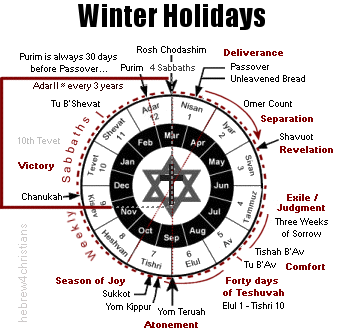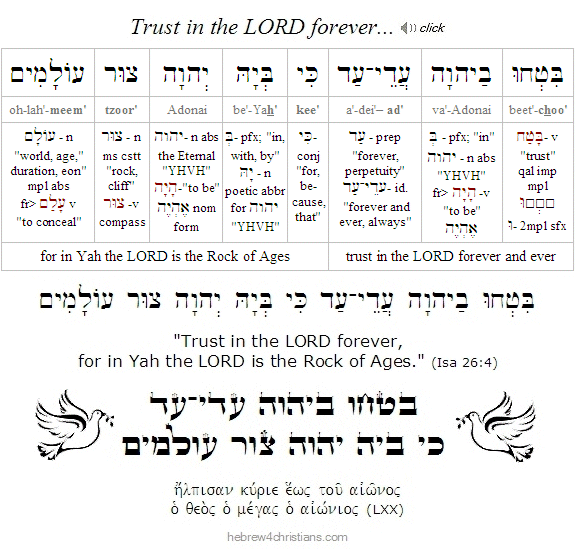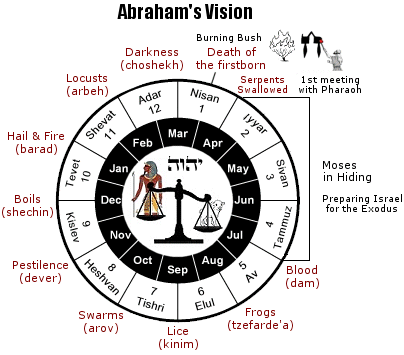|
Jewish Holiday Calendar
For February 2017 updates, please scroll past this entry....
The winter holidays (חגי החורף) remember special times when God acted on behalf of His people so that they would triumph over their enemies, and therefore they prophetically picture the final victory in the world to come.
The Winter Holidays:
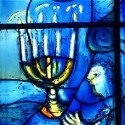
Note that in accordance with tradition, the following holiday dates begin at sundown:
- Month of Tevet (Thurs., Dec. 29th [eve] - Fri. Jan. 27th [day])
- Month of Shevat (Fri., Jan. 27th [eve] - Sat. Feb. 25th [day])
- Month of Adar (Sat., Feb. 25th [eve] - Mon., March 27th [day])
Note: Many Jewish calendars will list the first day of a holiday without indicating that the holiday actually begins sundown the night before. So, for example, while Purim begins Saturday, March 11th at sundown, some calendars may indicate that it occurs on Sunday, March 12th...
February 2017 Updates
Note: If any page content appears to be missing, please refresh the page...
Truth and the Sacred...
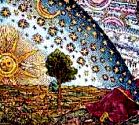
02.28.17 (Adar 2, 5777) "Let them make me a mikdash ("holy place," "sanctuary"), that I may dwell in their midst" (Exod. 25:8). Though this verse refers to the physical mishkan (i.e., "Tabernacle"), it more deeply refers to the duty of the heart to sanctify the Name of God and bring a sense of holiness to the inner life. This requires that we focus the mind and heart to honor the sacredness of life, taking "every thought captive" to the truth of God in Messiah (2 Cor. 10:5). Since our minds and hearts are gateways to spiritual revelation, we must be careful to not to abuse ourselves by indulging in sloppy thinking or unrestrained affections. God holds us responsible for what we think and believe (Acts 17:30-31), and that means we have a duty to honor moral reality and truth. There is an "ethic of belief," or a moral imperative to ascertain the truth and reject error in the realm of the spiritual. Since God holds us responsible to repent and believe the truth of salvation, He must have made it possible for us to do so ("ought" implies "can"). And indeed, God has created us in His image and likeness so that we are able to discern spiritual truth. He created us with a logical sense (rationality) as well as a moral sense (conscience) so that we can apprehend order and find meaning and beauty in the universe He created. All our knowledge presupposes this. Whenever we experience anything through our senses, for example, we use logic to categorize and generalize from the particular to the general, and whenever we make deductions in our thinking (comparing, making inferences, and so on), we likewise rely on logic. We have an innate intellectual and moral "compass" that points us to God.
Since we all necessarily must think in order to live, we should value clear thinking. This should be obvious enough, though people often make various errors and misjudgments because they devalue the effort required to carefully think through a question. As William James once said, "A great many people think they are thinking when they are merely rearranging their prejudices." When it comes to questions about the gospel, however, God regards such carelessness to be blameworthy. Again, the LORD holds us accountable for what we think and believe, especially when it comes to the reality and mission of His Son.
The truth about God is always available to human beings, if they are willing to look for it. The Divine Light that was created before the sun and the stars represents God's immanent presence that "lights up" all of creation - including our minds (Gen. 1:3). As Paul stated, "the invisible things of Him from the creation of the world are clearly seen so that people are without excuse" (Rom. 1:19-20). The heavens are constantly attesting to the reality of God's handiwork (Psalm 19:1). All of creation "shouts out" that there is a God. The Cosmological argument for the existence of a First Cause is intuitively known to be warranted.
The witness of God's truth is foundational to all of our thinking as well. If you regress far enough in a chain of reasoning, you will always encounter first principles, intuitions, axioms, and "apprehensions" of the laws of thought. This is how language works, or rather, how our mind necessarily discovers truth about reality. For example, the law of contradiction (or identity) is not discovered in experience, but is brought to experience by the operation of the mind. All reasoning is ultimately grounded on foundational first principles that are regarded as self-evident and that are known through the light of the mind itself. Even the pagan Greeks understood this. For instance, Aristotle said that both deduction and induction ultimately were based on the "intuitive grasp" of first principles of thinking itself.
 |
It's important to realize that no one "invented" the rules of logic (such as the law of identity, the law of contradiction, valid rules of inference, etc.); no, these are self-evident and presupposed in all forms of intelligible thinking about anything at all. In other words, God created the mind so that true thinking is possible. If you are reading these words, you are presently using logic. You are identifying and combining letters, interpreting their meaning, making connections and comparisons, and therefore making inferences. There is no way to argue that logic is "artificial" or culturally relative. No one can consistently use logic to argue against its universal validity. The revelation (not the invention) of logical first principles is part of God's "signature," if you will, of how the mind is wired to correspond to reality. Reason discovers order in the universe but does not create it ex nihilo. If you deny this, you have opted out of the realm of thought altogether and entered the realm of the absurd.
Likewise we have intuitive awareness regarding the existence of moral truth (i.e., the standard of justice and moral law), aesthetic truth (i.e., ideals of beauty, goodness, worth, and love), metaphysical truth (i.e., cause and effect relationships), and so on. Even scientific truth is based on principles that transcend the discipline of science itself (for example, the assumption that knowledge is "good" and should be obtained is not an empirical statement). The human mind naturally uses these sorts of categories in its thinking all the time, but each of these are ultimately derived from the rational mind of God Himself.
God created people so that they could discern truth about reality. The mind functions according to logical laws because it is made in the image and likeness of God Himself... God Himself is the ground of all logic, since He created reality and structured the world to be knowable according to its laws. As it is written: "In the beginning was the word/logic (ὁ λόγος), and the λόγος was with God, and the λόγος was God" (John 1:1). God created a world that exhibits order and great beauty. And since human beings were created b'tzelem Elohim, in the image of God, our thoughts (and the words used to formulate our thoughts) as well as our actions are likewise intended to exhibit order and beauty. "For the fruit of light (καρπὸς τοῦ πνεύματος) is found in all that is good and right and true" (Eph. 5:9). Therefore "whatever is true... think on these things" (Phil. 4:8).
Followers of Yeshua are commanded to love the truth and to think clearly about their faith. The ministry of reconciliation itself is defined as "the word of truth, by the power of God, through weapons of righteousness" (2 Cor. 6:7). Indeed, the word of truth (τὸν λόγον τῆς ἀληθείας) is a synonym for the "gospel of salvation" itself (Eph. 1:13; Col. 1:5; James 1:18). We are saved by Yeshua, who is the "way, the truth, and the life" (John 14:6). God commands all people to believe this truth (Acts 17:30-31; 1 Tim. 2:4). People perish because "they refuse to love the truth and so be saved" (2 Thess. 2:10-12). Therefore we see that the issue of truth is central to salvation itself....
For more on this topic, see the article "Metanoia: Teshuvah of the Mind."
To Life! L'Chaim!
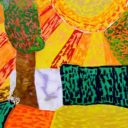
02.28.17 (Adar 2, 5777) "And the LORD spoke unto Moses, saying, 'Speak to the people of Israel, that they take for me a contribution (i.e., terumah: תְּרוּמָה); from everyone whose heart is moved you shall receive the contribution for me'" (Exod. 25:1-2). The sages remark that the phrase "take for me a portion" states a principle of spiritual life. In every circumstance, wherever you go or whatever you do, bring God into your experience (1 Cor. 10:31). "Take for me a portion" means take the desires and pleasures of the ordinary and transform them to be "for me," that is, for the soul, for the heart of your spiritual life.
"People generally think that it is the world, the environment, external relationships, which stand in one's way, in the way of ones' good fortune... and at bottom it is always man himself that stands in his own way." - Kierkegaard (Journals)
Shadows and Substance...

[ The following is related to this week's Torah reading, parashat Terumah... ]
02.28.17 (Adar 2, 5777) The Scriptures reveal that the Mishkan (or "Tabernacle") was intended to provide an elaborate "parable" or "pattern" that points to the salvation of our God (יְשׁוּעַת אֱלהֵינוּ). First, the Mishkan designated a central and sacred place (מִקְדָּשׁ) representing the Divine Presence, with the tribes carefully arrayed each side (east, west, north, and south) in cruciform , and the four families of the Levites arrayed on each side of the courtyard (Num. 2). The gate to the Mishkan opened from the east, where the tribe of Judah was positioned (Gen. 49:10) and where the Kohanim (priests) had their camp just outside the court (Heb. 7:14). As you entered the Mishkan itself, you would immediately behold the mizbe'ach (i.e., copper altar), which revealed the "korban principle," namely, that the only way to draw near to God is by means of sacrificial blood offered in exchange for the sinner, as is stated in the Torah, "For the life of the flesh is in the blood, and I have given it for you on the altar to make atonement for your souls, for it is the blood that makes atonement by the life" (Lev. 17:11), and "without the shedding of blood there is no forgiveness of sins" (Heb. 9:22). In this connection note that it is God who gives us the blood for atonement, and indeed the central (and ongoing) sacrifice on the altar was the daily offering of a defect-free male lamb along with unleavened bread and wine called "korban tamid" (קָרְבַּן תָּמִיד).
The korban tamid commemorates the Lamb of God and the deeper meaning of the Passover, which the LORD called "my Offering, my Bread" (see Num. 28:1-8). Note further that the sacrifice of the lamb upon the altar was openly displayed in the courtyard, just as the cross of Messiah was a public display (John 19:16; Col. 2:14-15), though the atonement for sin was made only after the High Priest sprinkled sacrificial blood upon the covering of the Ark of the Covenant that held the testimony of the law during the Yom Kippur service. Unlike the public sacrifice of the lamb upon the altar, the Yom Kippur ritual pictures the "hidden offering" of the blood before the Throne of God in the holy of holies "made without hands," that is, the greater priesthood of the Messiah who secures for us an eternal atonement (Heb. 10).
Therefore understand that the Mishkan (and later the Temple) was a provisional pattern designed by God to foretell the Substance and Reality to come, as it is written: "the Word became flesh and tabernacled with us" (John 1:14), and "when our Messiah appeared as the high priest of the good things that have come, He passed through the greater and more perfect Mishkan not made with hands (τῆς μείζονος καὶ τελειοτέρας σκηνῆς οὐ χειροποιήτου), that is, not of this creation, and entered once for all into the most holy place not by the blood of goats and calves but by his own blood, and so he himself secured eternal redemption" (Heb. 9:11-12).
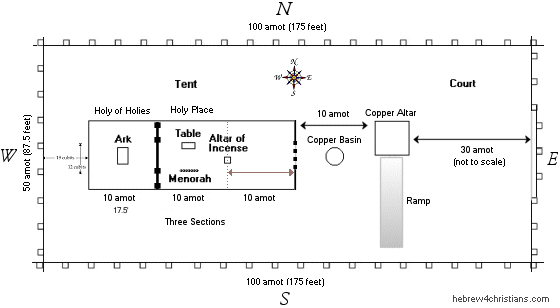 |
Note that the High Priest was required to perform the Yom Kippur avodah (service) alone, while wearing humble attire, divested of his glory, and in complete solitude: "No one may be in the tent of meeting from the time he enters to make atonement in the Holy Place until he comes out" (Lev. 16:17). The Hebrew text literally says, "no adam (אָדָם) shall be in the tent," which suggests that something more than the natural man is needed for divine intercession. And just as Moses alone approached God in the thick clouds at Sinai to receive the revelation of the Altar as mediator of the older covenant (Exod. 24:15), so Yeshua, the Mediator of the New Covenant, went through his severest agony on the cross as the darkness covered the earth (Luke 23:44; Matt. 27:45).
For more on this topic, see: "More on the Miskhan: Further thoughts on Tetzaveh."
Heart of the Sanctuary...
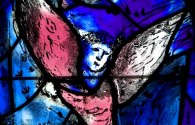
[ The following is related to this week's Torah reading, parashat Terumah... ]
02.28.17 (Adar 2, 5777) The earthy Tabernacle and its furnishings were designed to be "signs" and "shadows" of heavenly realities (Heb. 8:5). Moses was repeatedly commanded to make the Sanctuary according to the "pattern" revealed at Sinai (Exod. 25:9,40). At the inmost center of the earthly Tabernacle, the place symbolizing utmost holiness, was the Ark of the Covenant (אֲרוֹן־הַקּדֶשׁ), a "three-in-one" box that held the tablets of the covenant. The Ark served as a symbol of kisei ha-kavod (כִּסֵּא הַכָּבוֹד), God's Throne of Glory, since it stood entirely apart as the only furnishing in the Holy of Holies (קדֶשׁ הַקֳּדָשִׁים). Upon the crown or cover of the Ark (i.e., the kapporet) were fashioned two cherubim (i.e., angel-like figures) that faced one another (Exod. 25:17-18). According to the Talmud (Succah 5b), each cherub had the face of a child - one boy and one girl - and their wings spread heavenward as their eyes gazed upon the cover (Exod. 25:20; 1 Pet. 1:12). It was here - in the midst of sacred innocence, humility, purity, and hope - that the sacrificial blood was offered to make atonement for our sins, and it was here where God's Voice would be heard (Exod. 25:22; Num. 7:89). In the very heart of the Sanctuary, then, we see the Word of God and the sacrficial blood, foreshadowing the glory of the eternal redemption secured by Yeshua. As is written in our Scriptures: "For Messiah has entered, not into holy places made with hands, which are representations (ἀντίτυπος) of the true things, but into heaven itself, now to appear in the presence of God on our behalf" (Heb. 9:24).
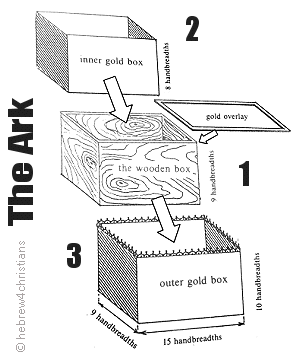 |
Note: The Ark is described as a "three-in-one" box because it was a wooden one set inside a gold one, with another gold one set inside the wooden one -- three boxes made one. Metaphorically this symbolizes Yeshua's humanity (the wood, the Tree of Life) surrounded above and within by God the Father and the Ruach HaKodesh (Holy Spirit).
King David and the Mishkan....
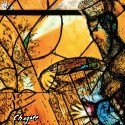
[ The following is related to this week's Torah reading, parashat Terumah... ]
02.27.17 (Adar 1, 5777) Though Moses was instructed to make the Tabernacle according to the "pattern" revealed at Sinai (Exod. 25:9,40), King David -- by direct revelation of the Holy Spirit -- later changed the size of the Tabernacle and its vessels, made additions to the original design, and even changed the priestly order of service itself (see 1 Chron. 28:11-20). King David's vision shows us that both the structure and service of the Tabernacle were provisionally intended to give physical expression to a deeper spiritual reality, and indeed the New Testament calls the service of the Temple "a copy and shadow (ὑποδείγματι καὶ σκιᾷ) of the heavenly things" (Heb. 8:5). But what were these heavenly things if not the ministry of Yeshua as our High Priest of the New Covenant? The New Covenant (בְּרִית חֲדָשָׁה) is called a "better covenant based on better promises" (Heb. 8:6), that was "not like the covenant that I made with their fathers on the day when I took them by the hand to bring them out of the land of Egypt" (see Jer. 31:31-33). Our Scriptures comment: "In speaking of a new covenant, he has made the first one obsolete, and what is becoming obsolete and growing old is ready to vanish away" (Heb. 8:13). Likewise we read, "When Messiah appeared as high priest of the good things that have come, then through the greater and more perfect tabernacle (not made with hands, that is, not of this creation), he entered once for all into the holy places, not by means of the blood of goats and calves but by means of his own blood, thus securing an eternal redemption" (Heb. 9:11-12). The earlier Levitical priesthood and its sacrificial system was "a shadow (σκιᾷ) of the good things to come, and not the true form (i.e., substance) of these realities" (Heb. 10:1).
Note: For more on this, see "King David and the Mishkan: Further Thoughts on Terumah."
Water for the Thirsting...

02.27.17 (Adar 1, 5777) "Let them make for me a sanctuary (מִקְדָּשׁ) that I may dwell in their midst" (Exod. 25:8). Each of us has an inner void, a place where only God belongs. Substituting the things of this world – money, power, fame, pleasures, etc. – never satisfies our deepest thirst for life. Indeed the Lord laments: "My people have committed a double wrong: they have rejected me, the fountain of life-giving water (מְקוֹר מַיִם חַיִּים), and they have dug cisterns for themselves, broken cisterns that can hold no water" (Jer. 2:13). God is found by the thirsty soul; he is revealed wherever the heart permits him to speak. As Yeshua said: "If you had known the gift of God, and the one speaking to you, you would have asked him, and he would have given you living water" (John 4:10). Ask today.
Shrine of the Heart...
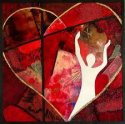
[ The following is related to this week's Torah reading, parashat Terumah... ]
02.27.17 (Adar 1, 5777) The sages have said that salvation may be likened to rebirth that delivers us from the "narrow places of Egypt" (i.e., from mitzrayim: -מ, "from," and צַר, "narrow") into newness of life... The first step of lasting deliverance (יְשׁוּעָה) is to receive the great revelation: "I AM the Lord your God," which begins our healing process (Exod. 20:2). We are set free from our bonds to surface appearances when we are made fully conscious of God's Presence, since we then understand everything in holy relationship with Ultimate Reality, the Ground and Source of all life (Acts 17:28). As it says in our Scriptures: "We look not to the things that are seen but to the things that are unseen: For the things that are seen are transient, but the things that are unseen are eternal" (2 Cor. 4:18). Therefore God says in our Torah, "Make for me a sacred place (מִקְדָּשׁ) so I can dwell within you" (Exod. 25:8). Each of us is created to be a "mishkan," that is, a dwelling place for God. Making a sanctuary of the heart means choosing to stay connected with reality, attuning the heart to hear the Voice of the Spirit, and consciously walking before the Divine Presence.
The Hebrew word terumah (תּרוּמָה), the name of our Torah portion, means "gift" or "contribution," which first of all refers to the decision to give of our hearts to enshrine God's Presence. We "set the LORD always before us"; we abide in the Vine and remain connected to Him (Psalm 16:8; John 15:5). It two-way partnership: we seek a home for God within our heart, we invite his Presence, so to speak, to dwell within us, and then we listen for God's invitation to come, to abide within his house and live as his beloved child (Rev. 3:20).
King David wrote, עוֹלָם חֶסֶד יִבָּנֶה / olam chesed yibaneh: "The world is built with love" (Psalm 89:2), and so indeed is God's place within our hearts... We esteem God as lovely and beautiful and wonderful and precious to us; we enshrine him and lift up our souls unto him in adoration and thanks. When we are willing to take part in the building of the sanctuary, God reveals to us "the pattern," that is, the inspiration that evidences His presence in our lives. As Yeshua said, "Let your light so shine" (Matt. 5:16).
"Knowing God is the condition for the sanctification of a human being by God's assistance and according to His intention. Wherever God is, there He is always creating... He wants to create a new human being. To need God is to become new. And to know God is the crucial thing." - Kierkegaard
Theology, Paradox, and Purim...
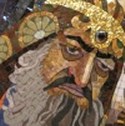
[ The following concerns the holiday of Purim, which begins Sat., March 11th at sundown... ]
02.26.17 (Shevat 30, 5777) The theme of the holiday of Purim (פּוּרִים) is the providential survival of the Jewish people despite various attempts by their enemies to destroy them. As such, Purim (like Passover) is a celebration of the deliverance and faithfulness of the LORD God of Israel. The terrible irony of the anti-Semite is that he hangs himself using his own rope. The tragic character of Haman, then, represents the Biblical archetype of all those who refuse to acknowledge God's faithful love for his people....
On the Torah's calendar, both the last month of the year (Adar) and the first month (Nisan) center on the theme of God's salvation. In Adar we celebrate Purim, and 30 days later we celebrate Passover... However Purim, unlike Passover, celebrates the "hiddenness" of God's actions. There is no dramatic power encounter; no parting of the Red Sea, no cataclysmic judgments regarding Purim. This is suggested by the name of the Book of Esther itself, Megillat Ester (מְגִלַּת אֶסְתֵּר), since the word megillah ("scroll") is related to the word giluy (גִּלּוּי), "revelation," and the name Esther is related to the word hester (הֶסְתֵר), meaning "hiddenness." The phrase hester panim (הֶסְתֵר פָּנִים) means "hiding of face" and is often used when discussing the role of God in the Book of Esther. God's plan is being fulfilled, step-by-step, even if it is presently hidden within the "natural" world of human beings and their choices (Jer. 10:23; Prov. 21:1).
For more on this subject, see "Theology, Paradox, and Purim."
Hiddenness and Disclosure...
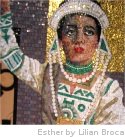
02.26.17 (Shevat 30, 5777) The sages extol the importance of the holiday of Purim because it reveals the hidden hand of God, despite his apparent absence in the affairs of this world... On the surface, each turn of the story could be explained naturally, or as simple "coincidence," yet in the end we realize that God was at work behind the scenes, carefully putting together deliverance for God's people. The eye of faith trusts in God's providential plan, despite appearances to the contrary. Indeed, the phrase hester panim (הֶסְתֵר פָּנִים) means "hiding of the face" and is often used when discussing the Book of Esther. Understood as hidden providence, hester panim is somewhat like the sun on an overcast day: Just because you don't see it doesn't mean it isn't there. God's great love is at work at all times, in all affairs of the universe, whether we perceive it or not.
The holiday of Purim occurs this coming Saturday, March 11th (at sundown) this year and runs through the following day. In anticipation of the coming holiday, then, let me wish you and your family Purim Sameach (פורים שמח) -- with the prayer that you will stand true to your faith, despite this wicked world and its syncretizing influences. Hooray for Mordecai! -- may the LORD raise up many like him; hooray for Esther, for she seized the day God gave to her!
Terumah - Offerings for Sanctuary...

02.26.17 (Shevat 30, 5777) The goal of the Sinai revelation was not only the giving of the law (Ten Commandments) to Israel but enshrining the Divine Presence to dwell in the midst of his people... In our Torah portion for this week (i.e., Parashat Terumah), we read how God asked the people to offer "gifts from the heart" to create a "place" for Him: "Let them make for me a sanctuary that I may dwell in their midst" (Exod. 25:8). The Hebrew word for "sanctuary" is mikdash (מִקְדָּשׁ), which comes from the root word kadash (קָדַשׁ), "to be set apart as sacred." A mikdash is therefore a "set apart space," or a "holy place" that represents something profoundly treasured - a place of beauty and worship, a refuge, a place of rest. Other words that share this root idea include kedushah (holiness), kiddushin (betrothal), kaddish (sanctification), kiddush (marking sacred time), and so on. When God said, "Let them make for me a mikdash," then, he was inviting the people to make a sacred place within their hearts for His Presence to be manifest.... The "materials" required to make this place - gold, silver, brass, red and purple yarns, fine linens, oils, spices, precious stones, etc. - were ultimately from the heart, expressed in free-will offerings given to God.
The LORD then showed Moses the pattern (i.e., tavnit: תַּבְנִית) according to which the Mishkan (tabernacle) and its contents were to be constructed. First an ark of acacia wood was to be overlaid with pure gold inside and out. The ark was to be fitted with gold rings and gold covered poles to make it portable. The two tablets of the law were to be stored inside the ark. Two cherubim (angel-like figures) were to placed facing each other over a cover of the ark called the kapporet (i.e., "Mercy Seat"). The ark was to be housed within an inner chamber of the tent called the Holy of Holies. Adjacent to the Holy of Holies was a second chamber called the Holy Place. This chamber would contain a table overlaid with pure gold that held twelve loaves of bread along with a golden, seven-branched menorah. The Holy of Holies was separated from the Holy Place by an ornamental veil called the parochet.
The design (or pattern) of the tent along with its exact dimensions was then given. The tent was intended to be portable, with a wooden frame covered by richly colored fabric and the hide of rams and goats. The outer courtyard was to include a sacrificial altar with horns of copper set at each corner. The portion ends with a description of the outer court, which was to be entirely enclosed by an ornamental fence made with fine linen on silver poles with hooks of silver and sockets of brass.
Calendar Note: Saturday (i.e., Feb. 25th) marked Rosh Chodesh Adar (חודש אדר), the twelfth month of the Jewish calendar (counting from the month of Nisan). Adar is the month that includes the holiday of Purim that always occurs 30 days before Passover (i.e., Sat. March 11th at sundown). Since it is the last month of the year, Adar also marks a season of teshuvah (repentance) for us. Just as the month of Elul (i.e., the month that precedes Rosh Hashanah and the New Year in the fall [Exod. 23:16]), so the month of Adar is a time set apart to reexamine the quality our spiritual life before the start of the new year of spring.
Our First and Last Amen...
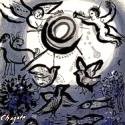
02.24.17 (Shevat 28, 5777) The first letter of the Hebrew alphabet, the letter Aleph (א), pictures the Word of God (דְּבַר הָאֱלהִים), the Holy Beginning. Aleph is "three-in-one," constructed from two Yods (signifying yadayim, or "hands") joined by a diagonal Vav (representing a man). One Yod (י) reaches upward while the other reaches downward, and both extend from the "fallen" Vav (ו) that pictures a "wounded Man" or Mediator (1 Tim. 2:5). In the Hebrew numbering system, Yod = 10 and Vav = 6, so adding up the three parts of Aleph yields 26, the same value as the Name of the LORD, YHVH (יהוה). All of this linked together, friends. The very first letter of the alphabet, the "king of the letters," pictures the loving Word of God who mediates heaven and earth so that we can experience and know the meaning of God's redeeming love. Similarly, the first letter of the Bible is the Bet (בּ) in bereshit (בְּרֵאשִׁית), and the last is the Nun (ן) in amen (אָמֵן). Put together, we have ben (בֵּן), the Hebrew word for "son." Yeshua, God the Son, therefore is rightly called "the Amen, the faithful and true witness, the beginning of God's creation" (Rev. 3:14). He is the "radiance of the glory of God" (זוֹהַר כְּבוֹדוֹ), the "exact imprint of his nature," the One who upholds (φέρων) the universe by the very word of His power (Heb. 1:3).
The Jewish sages say that "amen" serves as an declaration of the Kingship of God (often said quietly before the reciting the Shema) that may be understood as an acronym for the phrase El Melekh Ne'eman (אֵל מֶלֶךְ נֶאֱמָן): "God (אֵל) is a faithful (נֶאֱמָן) king (מֶלֶךְ)." For all the promises of God find their "Yes" in the Messiah. That is why it is through him that we utter our Amen to God for his glory" (2 Cor. 1:20).
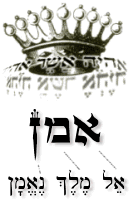 |
Shepherd in Darkness....

02.24.17 (Shevat 28, 5777) "Yea, though I walk through the valley of the shadow of death, I will fear no evil..." (Psalm 23:4). O God of Light, Light of the world, surely You know my need for light as I look to You, especially when darkness tries to extinguish my hope. Despite my inability to see you now, help me to know that you are with me; let "thy rod and thy staff comfort me" and lead me closer to you. Lord, when I am afraid, quicken the faith you have put within my heart. Be Thou my Shepherd in my darkness, O Lord my God...
גַּם כִּי־אֵלֵךְ בְּגֵיא צַלְמָוֶת
לא־אִירָא רָע כִּי־אַתָּה עִמָּדִי
שִׁבְטְךָ וּמִשְׁעַנְתֶּךָ הֵמָּה יְנַחֲמֻנִי
gam · ki · e·lekh · be·gei · tzal·ma·vet
lo · i·ra · ra, · ki · at·tah · im·ma·di
shiv·te·kha · u·mish·an·te·kha · hem·mah · ye·na·cha·mu·ni

"Even though I walk through the valley of the shadow of death,
I will fear no evil, for You are with me;
Your rod and your staff, they comfort me"
(Psalm 23:4)

"Be not afraid." Over and over again in the Scriptures we hear the LORD saying to those who trust in Him, al-tirah, "be not afraid." Nachman of Breslov is reported to have once said, "All the earth is a very narrow bridge (כָּל־הָעוֹלָם כֻּלּוֹ גֶּשֶׁר צַר מְאד), and the point of life is never to be afraid." Likewise we trust Yeshua to be the Bridge to the Father, the narrow way of passage that leads to everlasting life. He calls out to us in the storms of this world, "Take heart. It is I; be not afraid" (Matt. 14:27). The heart of faith senses the LORD's presence, even in the darkness, and hears the Spirit saying, "I am with you..."
I do not see the road ahead of me, I cannot know for certain where it will end. Nor do I really know myself, and the fact that I think I am following your will does not mean I am actually doing so. But I believe the desire to please you does in fact please you, and I hope I have that desire in all that I am doing. I hope that I will never do anything apart from that desire. And I know that if I do this you will lead me by the right road, though I may know nothing about it. Therefore, I will trust you always, though I may seem to be lost and in the shadow of death. I will not fear, for your are ever with me, and you will never leave me to face my perils alone. -- Thomas Merton: Seeds of Contemplation
In times of testing, how we desperately do we need a sense of companionship and intimacy with the Lord! When you feel abandoned, ashamed, or alone; or when you are afraid and unsure of yourself; or when pain distances you from others, nudging you to isolation or loneliness, then may God's Spirit brood over you, whispering your name, reminding you that you are never alone, and that God Himself is forever for you, despite yourself. Therefore "fear no evil," because God is with you in the midst of your present darkness. As it is written: "Surely goodness and love shall pursue you all the days of your life, and you shall dwell in the house of the LORD forever" (Psalm 23:6). Come alive, O heart of faith!
Note: We have major plumbing problems at our house and today we learned that we need thousands to get started with repairs. The doors and windows of our house need to be replaced, too. In addition, our poor dog is really sick, with a tumor on her neck that is bleeding. It's been a bit tough for us over here, though we trust God to see us through. Indeed God has always been more than enough for our struggles, and he will always be enough forever and ever. Thank you for remembering us in your prayers, friends.
Torah of the Stranger...
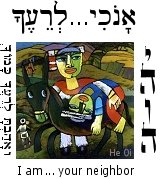
[ The following is related to this week's Torah reading, parashat Mishpatim... ]
02.24.17 (Shevat 28, 5777) From our Torah portion this week we are reminded not to wrong or oppress the "stranger," because we were also once strangers in Egypt (Exod. 22:21). The unspoken assumption here is that since we can understand how it feels to be oppressed and wounded, our suffering can be transformed into compassion for others. But how? How are we set free from our inner pain so that it no longer is a destructive force but rather a means of healing? By understanding our pain is carried by others, too. To acknowledge the pain of others means we also acknowledge our own. We let go of the weapons of blame and retribution when we give voice to the "stranger" within ourselves, when we realize that others share in our suffering: "Do not oppress a sojourner, for you know the soul of a stranger (וְאַתֶּם יְדַעְתֶּם אֶת־נֶפֶשׁ הַגֵּר), for you were strangers..." (Exod. 23:9). The Hebrew verb used here (i.e., yada, to know), implies intimacy, personal and direct understanding. You "know the soul" of the stranger by reliving their place, and by using the "good eye" to see how they share common our pain, joy, hope, and so on. Being awake to the suffering of others helps us find our own healing: We are brought out of the captivity of our inner Egypt into freedom and wholeness. Remembering what it was like to be a stranger helps us extend compassion to ourselves, and that brings healing to our hearts...
Teshuvah of Transformation

02.24.17 (Shevat 28, 5777) Our Lord taught that teshuvah (תְּשׁוּבָה), or "repentance," is more like spiritual rebirth than moral reformation: "Unless you are born from above (ἄνωθεν), you cannot see the kingdom of God" (John 3:3). This implies that we experience a radical shift in the way we "live and move and have our being" (Acts 17:28). The Greek word metanoia (μετάνοια) comes from a verb that means more than simply "changing your mind," but rather refers to the process of being transformed, or "metamorphosized," into a new kind of being -- like a worm that is changed into a butterfly that takes to the bright sky. Teshuvah, then, means turning (i.e., shuv: שׁוּב) to receive your new identity, your new life, in Messiah. To "repent" is to escape from the default mode of life to enter into a new realm of existence itself. It is an abandonment of the old life and nature – those self-serving assumptions driven by fear – so that we can walk in wonder and newness of life. So renew your minds, chaverim! Be young and tender at heart. Though the outer may self waste away, the inner self empowered and sustained for this very day and hour.
Let's pray for one another, friends, that we turn to God in the truth. May the Lord help each of us "put off our old self, which belongs to our former manner of life and is corrupt through deceitful desires, and to be renewed in the spirit of our minds, and to put on the new self, created after the likeness of God in true righteousness and holiness" (Eph. 4:22-24).
Hidden Treasures...

02.24.17 (Shevat 28, 5777) Our Savior sees through the surface problems of illness, weakness, moral failures, etc., to perceive the great underlying value of the person. God's love sees the hidden beauty, worth, and sanctity of your life. "The kingdom of heaven is like a merchant in search of fine pearls, who, on finding one pearl of great value, went and sold all that he had and bought it" (Matt. 13:45-46). You may be tempted to identify with the merchant and regard this parable as a challenge for you to give up everything to obtain the surpassing worth of the kingdom of heaven, but another way to understand it is to see God as the merchant, the central character of the story.... Instead of you paying the great price for the pearl, turn the story around: God pays the price - and you are regarded as His choice pearl! You are a treasured possession, the "apple of God's eye..."
Freedom and Deliverance...
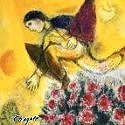
02.23.17 (Shevat 27, 5777) For all who are interested in living a "morally awake" life, the Torah speaks... As revealed by God's call for people to be set apart as sacred, it is evident that what matters most is what sort of person you are becoming, who you are and how you live. Obtaining peace with God and living in harmony with God's will is the way to attain inner peace and enduring freedom. Licentiousness and selfishness lead to destruction and despair. Know, then, what you can and cannot control in your life. Trying to control what you cannot leads to torment, frustration, and anxiety. Regard the affairs of this world as ephemeral matters that do not affect your present duties; refuse to be seduced by the fearmongering of the political world and its fallacious assumptions and false teaching. Keep focused, then, on what you can do: direct your heart and thoughts to God; surrender your emotional and volitional dispositions before the Throne of Grace, and then deliberately leave everything to the care of your Heavenly Father. If you feel emotionally or mentally out of control, ask the Lord to heal you and to deliver you from your brokenness. "Blessed are you Lord our God, Master of the Universe, who releases the captives..."
בָּרוּךְ אַתָּה יְהוָה אֱלהֵינוּ מֶלֶךְ הָעוֹלָם
מַתִּיר אֲסוּרִים
ba·rukh · at·tah · Adonai · E·lo·he·nu · me·lekh · ha·o·lam
mat·tir · a·su·rim

"Blessed are you, LORD our God Master of the Universe,
who releases the captives."
Glory as Consuming Fire...

[ The following is related to this week's Torah reading (Mishpatim). Please read the Torah portion to "find your place" here. ]
02.22.17 (Shevat 26, 5777) From our Torah for this week we read: "And the appearance of the glory of the LORD (וּמַרְאֵה כְּבוֹד יהוה) was like a consuming fire (אֵשׁ אכְלָה) on the top of the mountain in the sight of the people of Israel" (Exod. 24:17). Now some people regard this fire as a threat, even a sign of God's judgment, though it is better to regard it as a sign of God's glorious passion. After all, the pillar of fire had led the people out of bondage, just as it later dwelt between the cherubim upon the Ark of the Covenant. Indeed the fire that fell upon followers of Yeshua at Pentecost was the same manifestation of the glory of God's passionate love that was revealed at Sinai. Our God is a "consuming fire" (אֵשׁ אכְלָה), which means that He is full of passion and zeal that your heart fully belongs to Him...
כִּי יְהוָה אֱלהֶיךָ אֵשׁ אכְלָה הוּא אֵל קַנָּא
ki · Adonai · E·lo·he·kha · esh · o·khe·lah · hu · El · kan·na

"For the LORD your God is a consuming fire, a zealous God."
(Deut. 4:24)

Hebrew Study Card
The metaphor of God as a "Consuming Fire" (אֵשׁ אכְלָה) connotes that He is passionately concerned with our relationship to the truth. "Therefore let us be grateful for receiving a kingdom that cannot be shaken, and thus let us offer to God acceptable worship, with reverence and awe, for our God is a consuming fire" (Heb. 12:28-29). We are promised a kingdom that cannot be shaken, wherein the Fire that consumes will consume all things that are not established by our Heavenly Father... "Know therefore today, and lay it to your heart, that the LORD is God in heaven above and on the earth beneath; there is no other. Therefore you shall keep his statutes and his commandments, which I command you today..." (Deut. 4:39-40). Our lives on the altar ascend to God in praise.
Walking Uprightly...

[ The following is related to this week's Torah reading (Mishpatim)... ]
02.22.17 (Shevat 26, 5777) In our Torah portion this week we read, "Keep yourselves away from a false matter" (Exod. 23:7). In this connection note that the Hebrew word for falsehood (or lie) is sheker (שֶׁקֶר), which can be rearranged to spell kesher (קֶשֶׁר), meaning a band, gang, or group of people... The power of the lie is often found in the "group" rather than in the individual, and if enough people in a group repeat something untrue, eventually the individual's conscience will be overruled and the truth will be lost... This is a common methodology regularly employed by mass media for purposes of political propaganda.
Regarding this commandment Abraham Twerski comments that it means we should act in a way that will not move us to "hide," and that includes hiding within the anonymity of the crowd. "Think about what you are about to do. Is there a possibility that you may at some time have to deny that you did it? If so, then do not do it" (Twerski on Chumash).
Each of us must individually strive to be yashar (יָשָׁר) - upright and honest, and free from the complications and devious speech that attends to lies. We are to be "simple" (תָּמִים) with the LORD our God (Deut. 18:13), which requires that we are first willing to be rigorously honest with ourselves. "No person is saved except by grace; but there is one sin that makes grace impossible, and that is dishonesty; and there is one thing God must forever and unconditionally require, and that is honesty" (Kierkegaard).
In this connection we note that the midrash teaches that the Hebrew word for "truth" (i.e., emet: אֱמֶת) is composed of the first, middle, and last letters of the alphabet, whereas the three letters that spell "falsehood" (i.e., sheker: שֶׁקֶר) all stand next to one another. Truth creates a firm foundation, secure, strong, and trustworthy, while falsehood is unstable. As it is written, "truth stands forever, falsehood has no legs." In other words, the way of truth is "self-authenticating" and made secure, whereas the way of falsehood is "unlivewithable" and made unsteady...
The Torah of Love...
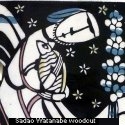
02.21.17 (Shevat 25, 5777) The heart of God will never lead us to a place outside of his will (Gal. 5:22-23); neither is the divine love removed from us, but instead reaches into the darkness of our fear to deliver us from our sin (Jer. 31:3; John 6:44). Love is the greatest of the spiritual virtues, since its passion reaches "beyond the law" and its moral perfections to embrace the unworthy, the broken, and the defiled (see Rom. 3:21; 2 Cor. 5:21). This is the Torah of love, which sees beyond the imperative to the "optative," from the realm of "ought" to the realm of passionate and holy desire. How else can we explain the cross? That God would sacrifice his purity for our sakes - to go beyond the law's own word and verdict - to rescue us from the curse of law.... Hallelujah! "And now abides faith, hope, and love; but the greatest of these is love" (1 Cor. 13:13). Dear Lord God, please guide our way into your heart and love; give us a desire to truly know you; and impart to us the spirit of your love so that we may know ourselves as your love also knows us. Amen.
You shall be holy to Me...

[ The following is related to this week's Torah reading (Mishpatim). ]
02.21.17 (Shevat 25, 5777) A prophecy from our Torah portion this week reads: "You shall be holy to me" (Exod. 22:31). That is, you shall be "set apart" to know and live in God's love; you shall dwell in the secret place of the Most High, a place prepared especially for you (Psalm 91:1; John 14:2). Properly understood, holiness (קְדֻשָּׁה) expresses the realm of being loved, cared for, and watched over. It is an intimacy that is exclusively hallowed and made sacred. God calls you to his closed off chamber, the "holy of holies" where He dwells; there he invites you in, he welcomes you, he desires to see you (Heb. 4:16). The deeper meaning of holiness is to be spiritually intimate with God. Hence the Spirit of Holiness uses romantic and even sexual imagery in the Song of Songs to express the deepest yearnings we have for connection with God...
The Decrees of Torah...

[ The following concerns this week's Torah reading, parashat Mishpatim... ]
02.21.17 (Shevat 25, 5777) The Hebrew word mitzvah (מִצְוָה) generally means "divine commandment" or "blessing" (mitzvot is the plural form). The various mitzvot found in the Torah may be further divided into the subcategories of "chukkim u'mishpatim" (Deut. 4:5). Chukkim (חֻקִּים) are statutes given without a reason (i.e., divine decrees). The classic example is the decree of the Red Heifer, which, legend has it, defied even the wisdom of King Solomon. Mishpatim (מִשְׁפָּטִים), on the other hand, are laws given for a discernible reason (i.e., logical laws). An example would be the commandment to give charity or prohibitions against theft and murder. These mitzvot are inherently rational and appeal to the need for civil and moral order. The relationship between chukkim and mishpatim -- or between "faith and reason" -- is highly interdependent, however, and the sages ultimately concluded that every commandment (regardless of type) may be regarded as if it were a decree given without a reason (i.e., all "mishpatim" may be reduced to the status of "chukkim"). This is because the merely rational acceptance of "religion" is insufficient to touch the heart of faith. We do not "understand to believe," but the other way around. A person who thinks it's "reasonable" to obey one commandment might later change his or her mind if their passion sways them to suddenly regard it as "irrational." No, we should obey God simply because God asks us to trust in him. We believe to understand... The great example here is the Akedah (עֲקֵדָה, "binding"), when Abraham willingly offered up his beloved son Isaac upon the altar as a sacrifice (Gen. 22:1-14). Abraham surely understood all the "commandments, decrees, and laws" of God (Gen. 26:5), but his faith led him to surrender his need to understand in devotion to the LORD. Abraham's Torah was that of faith: "And he believed in the LORD, and He counted it to him as righteousness" (Gen. 15:6). Surrendering our ego's reasoning (as absolute) by yielding to the wisdom of the LORD is the essential decree of the entire Torah.... (for more on this subject, click here...)
God's Healing Truth...

02.21.17 (Shevat 25, 5777) It is written in our Torah for this week (i.e., Mishpatim): "Distance yourself from a false word..." (Exod. 23:7). The Shlomo Chanoch commented: "One of the things the Messiah will do is to bring those who are far closer, and those who are close farther." This is seen in the Hebrew word for truth (i.e., emet: אֱמֶת), where the letters are far apart (i.e., Aleph [א] at the beginning, Mem [מ] in the middle, and Tav [ת] at the end), whereas the letters of the word for falsehood, (i.e., sheker: שֶׁקֶר), are all in sequence (Shin [שׁ], Qof [ק], Resh [ר]). "The first shall be last and the last shall be first." When the Messiah returns, untruth will be undone and driven apart, but the truth of God's love will bring all things together in complete healing (see Eph. 1:10).
כִּי־הִנְנִי בוֹרֵא שָׁמַיִם חֲדָשִׁים וָאָרֶץ חֲדָשָׁה
וְלא תִזָּכַרְנָה הָרִאשׁנוֹת
וְלא תַעֲלֶינָה עַל־לֵב
ki · hi·nei·ni · vo·rei · sha·ma·yim · cha·da·shim · va'a·retz · cha·da·shah
ve'lo · ti·za·char·nah · ha'rish·o·not
ve'lo · ta·a·le·nah · al · lev

"For behold! I am creating a new heaven and a new earth;
The former things shall not be remembered,
they shall not rise within the heart"
(Isa. 65:17)

Carried by the Spirit...

02.21.17 (Shevat 25, 5777) Sin is defined as the transgression of Torah (i.e., ἀνομία) in the Scriptures (1 John 3:4), and at its root expresses an unwillingness to trust that what God wants is your deepest happiness. Because of this, sin goes "out of bounds" and expresses itself as the desire to control one's life, to define "the good" (or the bad) on its own terms. Surrender, on the other hand, gives up control and relies upon God's care. It relaxes because it accepts God's love as a gift and not as something to be earned. Meister Eckhart said it this way, "God is not attained by a process of addition to anything in the soul, but by a process of subtraction." In other words, we don't need to do anything to be free, though we must "get out of the way" for the Holy Spirit to do the work in us (Phil. 2:13; Isa. 26:12). "If the Son shall set you free, you shall be free indeed" (John 8:36). Set us free, O precious Lord!
Present before God...

02.21.17 (Shevat 25, 5777) It is easy enough to hurry past words of Scripture without slowing down to seriously reflect on what is being said. For instance, in our Torah portion for this week (Mishpatim) we read: "The LORD said to Moses, "Come up to me on the mountain and wait there, that I may give you the tablets of stone with the law and the commandment, which I have written for their instruction" (Exod. 24:12). The Hebrew words vehyei sham (וֶהְיֵה־שָׁם), usually translated as "and wait there," can also be translated as "and be there." But why -- if every jot and tittle of Torah is indeed significant (Matt. 5:18) -- does the text say "come up to the mountain" and then add the seemingly superfluous phrase "and be there"? The sages answer that God is asking Moses to be present, be awake, and to be utterly focused – "with all your heart, soul, and might." This is to teach us that to receive God's revelation, we need to show up – "to be there" – earnestly seeking his heart.
First Word of Revelation...
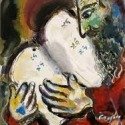
02.21.17 (Shevat 25, 5777) The Ten Commandments were given in the singular, not in the plural: "I AM the LORD your (singular) God" – to emphasize that each person must hear the message and receive it for themselves. Read and understand the statement: "I AM the LORD your God" (אָנכִי יְהוָה אֱלהֶיךָ) as the starting point of all Torah, the very first commandment, and the foundation for all that follows. Revelation begins with the apprehension of "I AM" for you – I AM your God who brings you out of slavery to your fear and your captivity to vanity. When you receive the Torah of "I AM the LORD your God," you are made a child of eternal promise, and even if heaven and earth should melt away in fervent heat, nothing can keep you from the care of your heavenly Father (Rom. 8:31-39). Perfect love casts out fear. Make yourself bold, then, to receive God's love for your soul. Abide in God's love; make it your own. Loving God is the beginning and end of all of reality.
Torah Of Empathy...
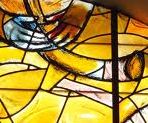
02.20.17 (Shevat 24, 5777) The "silver rule" of Torah may be stated as, "Do not do to others as you would not have them do to you," (i.e., "do no harm"), whereas the "golden rule" may be stated positively as, "Do to others as they would have done to them" (i.e., "do the good"). Both principles are based on the concept of reciprocity: How you treat others affects who you are, and vice-versa, and therefore we see the centrality of respecting ourselves, of regarding ourselves as redeemable, lovable, and so on. "You shall not wrong or oppress a stranger, for you were strangers in the land of Egypt" (Exod. 22:20), and this includes the stranger you make of yourself; the parts of yourself you hide away from consciousness. Moral reality is grounded in empathy, or the exercise of sympathetic imagination... "Give and it shall be given back to you." Put yourself in the place of the other - the stranger, the outsider, the lost child - and remember the pain you experienced when you were an outsider, isolated and excluded... As we recognize the value, dignity, and worth of others, so we will find it within our own hearts, and this enables us to see more of the good. The measure you use will be measured back to you (Luke 6:38).
Weightier Matters of Torah...

[ The following is related to this week's Torah reading, parashat Mishpatim... ]
02.20.17 (Shevat 24, 5777) In our Torah for this week we read: "If you take your neighbor's cloak in pledge, you shall return it to him before the sun goes down, for that is his only covering, and it is his cloak for his body; in what else shall he sleep? And if he cries to me, I will hear, כִּי־חַנּוּן אָנִי -- for I AM compassionate" (Exod. 22:26-27). Here we see the "weightier matter" that compassion supersedes the rules (mishpatim) for lending to others. Empathy for one who might shiver through the night is more important to God than the letter of the law. Torah rules were given to test our responsibility to others. Hypocritically hiding behind the "letter of the law" is not the way of true Torah (Matt. 23:23). As Rabbi Paul said, "the goal (τέλος) of the commandment is love that issues from a pure heart and a good conscience and a sincere faith" (1 Tim. 1:5).
Note: This goes to show you that you can be technically right -- you can argue for the "truth" of your interest -- but you can be spiritually wrong. Spiritual truth cannot be separated from goodness and mercy...
Navigating Moral Reality...

[ The following is related to this week's Torah reading, parashat Mishpatim... ]
02.20.17 (Shevat 24, 5777) In general, people don't like to be told what to do but would rather make their own judgments... However the moral rules of Torah may be likened to guideposts along the way, warning us about dangers up ahead. And just as a physical law like gravity describes material reality, so a moral law describes spiritual reality. We can no more deny moral reality than we can deny physical reality, though the effect of violating moral truth is often not physical but spiritual - affecting our inner life, our conscience, our sense of value, our relationships, and so on. In either case, however, we deny reality at our own peril.
Laws of any kind are generalizations, of course. In science, for instance, we inductively sample phenomena and then universalize that experience as a law applicable in all similarly controlled conditions, until proven otherwise. In the case of moral reality, we may have revealed and intuitive awareness of value, but we still must wrestle to discover how to apply such truth to our lives. For example, a moral rule is to always "speak truth," but in some cases this rule can be "broken" for the sake of a more important truth. For instance, we are forbidden to gossip because it hurts other people, and the law of truth-telling may be suspended if we were hiding Jews in our attic and the Nazis asked if we were doing so, and so on (פיקוח נפש). Moral and social rules speak to our need for boundaries, for sacred space, safety, and provide means to show respect to one another. That's the "spirit of the law," the deeper reason for its expression. The "role of the rule" is to promote and upbuild life; a righteous rule helps us discern how to limit and redirect our impulses to express godly character. As is also written in our Scriptures: "You shall therefore keep my statutes and my rules; if a person does them, he shall live by them: I AM the LORD" (Lev. 18:5).
Note: A somewhat mixed case, involving both physical and spiritual reality, is given in our Torah reading this week: "You shall be sacred to me (קדֶשׁ תִּהְיוּן לִי); therefore you shall not eat any flesh that is torn by beasts in the field" (Exod. 22:31). Why not eat such meat? Because it may both cause physical sickness (i.e., disease) while it also violates the dignity of our life, causing spiritual sickness, too.
Torah within the Heart...

[ The following is related to this week's Torah reading (Mishpatim). Please read the Torah portion to "find your place" here. ]
02.20.17 (Shevat 24, 5777) It has been said that a holy life requires rules, just as art needs form to shape its content... When rules are regarded abstractly, however, they may seem like arbitrary imperatives; when they are regarded as internal principles, on the other hand, they express a pattern of life. Looked at positively, the "law" is not so much a "gilded cage" as a set of "directions" for the way of life. Living the way of Torah is a mark of being a child of the Father of the House. Believers of Yeshua will love the Torah, since it is "written inwardly," on the heart, as it says: "I will put my Torah (תּוֹרָה) within them, and I will write it on their hearts. And I will be their God, and they shall be my people" (Jer. 31:33, Heb. 10:16-17). "For we are his workmanship, created in Yeshua the Messiah for good works (ma'asim tovim), which God prepared beforehand that we should walk in them" (Eph.2:20).
נָתַתִּי אֶת־תּוֹרָתִי בְּקִרְבָּם וְעַל־לִבָּם אֶכְתֲּבֶנָּה
וְהָיִיתִי לָהֶם לֵאלהִים וְהֵמָּה יִהְיוּ־לִי לְעָם
na·ta·ti · et · to·ra·ti · be·kir·bam · va·al · lib·bam · ekh·ta·ve·nah
ve·ha·yi·ti · la·hem · le·lo·him · ve·hem·mah · yi·yu-li · le·am

"I will put my Torah within them, and I will write it on their hearts.
And I will be their God, and they shall be my people."
(Jer. 31:33b)

Hebrew Study Card
Although this prophecy will be completely fulfilled when the Jewish people accept Yeshua as Messiah during the time of the coming kingdom, it has obvious application for believers in the present age (e.g., see Heb. 8:8-12; 10:16-17). As it is written, "Blessed is the man whose delight is the Torah of the LORD, and who meditates upon the Torah day and night" (Psalm 1:2). Indeed, the Torah of the LORD is perfect (Psalm 19:7). "Oh how I love your law! It is my meditation all the day" (Psalm 119:97).
In this connection, here are a few verses from the New Testament that speak of Torah acts of gemilut chassidim (acts of lovingkindness): "He gave himself for us to redeem us from all lawlessness and to purify for himself a people for his own possession who are zealous for good works" (Titus 2:14); "The saying is trustworthy, and I want you to insist on these things, so that those who have believed in God may be careful to devote themselves to good works. These things are excellent and profitable for people" (Titus 3:8); "What good is it, my brothers, if someone claims to have faith but has no good works (i.e., ma'asim tovim) to prove it? Is such "faith" able to save him? (James 2:14); "For we must all appear before the judgment seat of Messiah, so that each one may receive what is due for what he has done in the body, whether good or evil" (2 Cor. 5:10); therefore, "Let us consider how to stir up one another to love and good works" (Heb. 10:24).
The Work of Faith...
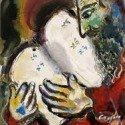
[ The following is related to this week's Torah reading, parashat Mishpatim... ]
02.20.17 (Shevat 24, 5777) In our Torah portion for this week we read that when the people gathered before Moses to receive the covenant, they said: "All that the LORD has spoken we will do and we will hear (נַעֲשֶׂה וְנִשְׁמָע)." Note the order: first comes the decision to obey, and then comes understanding... As Yeshua said, "If anyone's will is to do God's will, he will know," and "if you know these things, blessed are you if you do them" (John 7:17; 13:17). The heart of faith is willing to do what God asks before hearing what exactly is required. Many people operate the other way round, sitting in judgment of God's word, demanding to understand why they should obey. You cannot understand apart from trust, however, and that is categorically true of all forms of knowledge. We are to be "doers of the word and not hearers only, deceiving ourselves" (James 1:22). We don't audit the words of Scripture since we ourselves are under examination! The Scriptures demand us to respond, choose, decide. The word is like a shofar blast rousing us to action. We are to be doers, not just passive hearers. The Greek verb is emphatic: "Be doers!" (γίνεσθε) means "be born! come alive! do, live, exist before God! This is a call to creative action, to newness of life!
The Scriptures state that "if anyone is a hearer of the word and not a doer, he is like a man who looks intently at his natural face in a mirror. For he looks at himself and goes away and at once forgets what he was like" (James 1:23-24). If we just hear the truth but do not act upon it, we are comically likened to someone who carefully looks at his face in a mirror but then promptly forgets what he looks like after he steps away... Likewise those who only hear the word but do not bring it to life in their deeds forget who they are and why they were created (Eph. 2:10; Titus 2:14; Col. 1:10). When we look into the mirror of truth we see our need for teshuvah and turn to God for the healing miracle he provides (Heb. 4:12).
There is a deeper law, however, that reveals something beyond our passing image. When we look intently into the "perfect law of liberty" (תּוֹרַת הַחֵרוּת וּמַחֲזִיק) - the law of faith, hope, and love for our Savior - we find blessing in our deeds (James 1:25). Note that the verb translated "look into" the law of liberty is the same used when John stooped down to "look inside" the empty tomb of Yeshua (John 20:5). The deeper law reveals the resurrection power of God's invincible love. The Torah of the New Covenant also has many mitzvot, though these are based on the love God gives to us in Yeshua: "This is my Torah: that you love one another as I have loved you" (John 13:34). The imperatives are grounded in love...
We are set free from the verdict of the law to serve God without fear, on the basis of his saving love and grace given in Yeshua (Gal. 5:1), but our freedom is not meant to violate the Ten Commandments or to engage in licentiousness (Gal. 5:13; Matt. 7:21). The moral law speaks, as it were, to young children who need a guardian until they can attain to their place as hiers (Gal. 3:24). Mature sons and daughters do not not need the law but operate on a different level, and enjoy a different relationship with the Master of the house. Serving God this way results in holy passion. The verse, "the appearance (i.e., mareh: מַרְאֵה) of God's glory was like a consuming fire" (Exod. 24:17) may be read, "the mirror (or reflection) of God's glory..." When we act as God's children, full of faith in his love, and walking before the power of his presence, our hearts reflect his passion, too.
As a brief addendum, let me ask how you can "do the word" and live in harmony with the divine commandments... The dividing line between faith and works is often difficult to discern, after all, and indeed Yeshua told us that faith in Him is itself a type of "work" (John 6:29). Studying the Scriptures, praying, trusting God in the midst of our pains and struggles, and worshiping are all in a sense "works," yet they express the inner reality of faith.... Here is the conundrum: Do we "do the word" by means of our own resolution (i.e., will) to act, or is a deeper miracle of transformation first necessary? If the latter, is the miracle entirely sufficient, or do we need to add something else for it to come into being? The Scriptures command us to be "slow to anger" and "put away wrath," and yet how is that possible apart from God's help, after all? How can we manage destructive emotions that sometimes arise within the heart? How do we "put away" fear? On the other hand, how can we be commanded to love? to be joyful? full of faith? These considerations reveal the divine-human partnership: We "work out our own salvation with fear and trembling, for it is God who works in you, both to will and to work for his good pleasure" (Phil. 2:12-13). In the end we are faced with paradox: We are utterly dependent upon God to work within our hearts for salvation, yet we are also entirely responsible for working out that salvation in our daily lives. "With man this is impossible, but with God all things are possible" (Mark 10:27).
Moses Receives the Law...
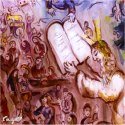
[ The following is related to this week's Torah reading, parashat Mishpatim... ]
02.19.17 (Shevat 23, 5777) Last week we read in our Torah that exactly seven weeks after the Exodus from Egypt (i.e., 49 days after the first Passover), Moses gathered the Israelites at the foot of Mount Sinai to enter into covenant with the LORD. In a dramatic display of thunder, lightning, billowing smoke and fire, the LORD descended upon the mountain and recited the Ten Commandments to the people. Upon hearing the awesome Voice of God, however, the people shrank back in fear and begged Moses to be their mediator before God. The people then stood far off, while Moses alone drew near to the thick darkness to receive further instructions from the LORD.
In this week's Torah portion (i.e., Mishpatim) we learn about these additional instructions Moses received on the mountain. The Jewish sages traditionally count 53 distinct commandments in this portion of the Torah, easily making it one of the most "legalistic" (i.e., law-focused) sections of the entire Bible. Civil laws, liability laws, criminal laws, agricultural laws, financial laws, family purity laws, Sabbath laws, and holiday laws are all given in this portion. These various social and civil laws are called "mishpatim" (מִשְׁפָּטִים), a plural word that means "rules" or "judgments."
After receiving these additional rules, Moses descended Sinai and went before the people to reveal to them the words of the LORD. Upon hearing the details, the people responded in unison, "all the words which the LORD has said we will do" (i.e., na'aseh: נַעֲשֶׂה). Moses then wrote down the words of the covenant into a separate scroll (sefer habrit), built an altar at the foot of Sinai, and ordered sacrifices to the LORD to be made. He then took the sacrificial blood from the offerings, threw half upon the altar, and read the scroll of the covenant to the people. The people ratified the covenant by saying, "all that the LORD says we will do and obey" (i.e., na'aseh ve'nishmah: נַעֲשֶׂה וְנִשְׁמָע). Upon hearing this, Moses took the other half of the sacrificial blood and threw it on the people saying, "Behold the blood of the covenant that the LORD has made with you in accordance with all these words" (Heb. 9:18). After this ceremony, Moses, Aaron, and seventy of the elders of Israel ascended Mount Sinai to eat a "covenant affirmation meal" between Israel and the LORD.
Upon returning from the mountain with the elders, the LORD commanded Moses to go back up to receive the tablets of stone inscribed with the Ten Commandments. On the seventh day there, he heard the Voice of the LORD calling to him from the midst of the cloud of glory, and then entered into the Presence of the LORD. He remained on the mountain for a total of forty days and forty nights receiving further revelation about the Mishkan (i.e., Tabernacle) while the Israelites waited for him at the camp down below.
Shabbat Shekalim - שבת שקלים

[ This coming Sabbath is called "Shabbat Shekalim," anticipating the advent of spring... ]
02.19.17 (Shevat 23, 5777) Four "special Sabbaths" occur just before the start of spring: two before the holiday of Purim and two before the holiday of Passover. Collectively, these Sabbaths are called "The Four Shabbatot" and four additional Torah readings (called Arba Parashiyot, or the "four portions") are read on each of these Sabbaths in preparation for the holidays, particularly for the central holiday of Passover. The names of these Sabbaths are Shabbat Shekalim, Shabbat Zakhor, Shabbat Parah, and Shabbat HaChodesh, respectively.
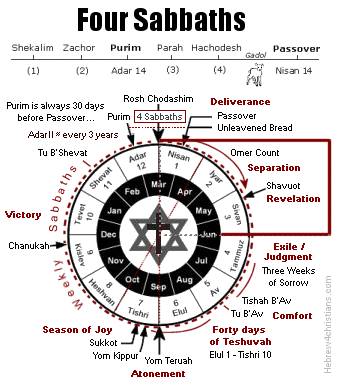 |
The first of the four Sabbaths is called Shabbat Shekalim (שבת שקלים), "the Sabbath of the Shekels," which occurs just before the month of Adar begins. An additional reading (Exod. 30:11-16) is appended to the regular Torah reading that describes the contribution of a half-shekel for the construction and upkeep of the Mishkan (Tabernacle). According to a midrash in the Talmud (Bavli, Shekalim 1), the half-shekel represents a "fiery coin" that the LORD brought from underneath the Throne of His Glory to symbolically "atone" for the sin of the Golden Calf. Since every Jew was required to give this "widow's mite," repentance is accepted for all who come in true humility before the LORD. For us, it might be a time to remember those who offer personal sacrifices so that we also might draw closer to God.
Note: This coming Saturday (i.e., Feb. 25th) marks Rosh Chodesh Adar (חודש אדר), the twelfth month of the Jewish calendar (counting from the month of Nisan).
Torah of Humility...

02.17.17 (Shevat 21, 5777) All who surrender obey, but not all who obey surrender... While we are not saved by obeying rules of conduct but solely by trusting in God's love (Eph. 2:9; 2 Tim. 1:9, Titus 3:5, Rom. 11:6, etc.), we will find ourselves willing to obey God from the heart only if we are really convinced that he loves and accepts us, despite our sins... The love of God is not without discipline, structure, and order, after all. Love is polite; it listens; it seeks to serve and worship with reverence and gratitude. So, after unconditionally surrendering our hearts to God, we will desire to do his will, that is, we will want to know and to do his Torah (Psalm 1:2), and the Holy Spirit will therefore lead us to a place of order, faithfulness, and peace - not to disorder and confusion (1 Cor. 14:33,40). There are disciplines to the life of faith that are instilled within our hearts to help us "work out" the inner transformation of God's love into our daily lives (Jer 31:33; Heb. 10:16). And that is part of the rationale for liturgy, ritual, observing the moedim (biblical holidays), reading the weekly Torah portions, giving tzedakah, performing acts of chesed, and so on. Ideally such things are meant to provide "form" to the inner content of the heart. Shabbat Shalom, chaverim!
Unchosen Chosen People...
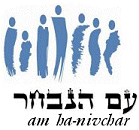
[ The following is related to this week's Torah reading (Yitro). ]
02.17.17 (Shevat 21, 5777) Some people seem to get offended at the idea that the Jews are called am hanivchar (עַם נִבְחָר), the "chosen people" of the LORD (Deut. 14:1-2), though it is important to understand what this really means... Spiritually speaking, being a Jew means that you are indeed "chosen" to take on additional responsibilities to live in holiness for the glory of God and for the welfare of the world (Rom. 2:28-3:2). Therefore a Jew takes the role of being a both a mediator (i.e., "priest") and ambassador for God. The performance of various mitzvot are for the greater purpose of tikkun olam, the "repair of the world." After all, Israel was always meant to be a "light to the nations." God's greater plan was for all the families of the earth to come to know Him and give Him glory, as Abraham is av hamon goyim (אַב הֲמוֹן גּוֹיִם), the father of a multitude of nations (Gen. 17:4; Rom. 4:16). "Jewishness" is therefore not an end in itself but rather a means to bring healing truth to the nations. Indeed, the entire redemptive story of the Scriptures is about the cosmic conflict to deliver humanity from the "curse" by means of the "Seed of the woman" who would come. As the Apostle Paul clearly affirmed, any talk of genetics, bloodlines, lineage, and so on are a means to this greater redemptive end (Phil. 3:2-9).
For more on this topic see: "The Unchosen Chosen: Further thoughts on parashat Yitro."
Everyday Revelation...
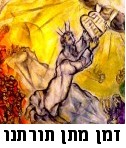
02.17.17 (Shevat 21, 5777) The Kotzker rebbe asked, "Why is Shavuot (i.e., Pentecost) called 'zman mattan torateinu,' the time of the giving of our Torah, rather than 'zman kabbalat torateinu,' the time of the receiving of our Torah? The reason is that on that momentous day at Sinai, only the giving of the Torah occurred, whereas the receiving of the Torah must take place each and every day, as it says, "Trust in the LORD 'bekhol libbekha' (בְּכָל־לִבֶּךָ) - with all your heart; and know Him 'bekol derakhekha' (בְּכָל־דְּרָכֶיךָ), in all your ways" (Prov. 3:5-6). The giving of the Torah is described as a "loud and never-ending voice" (Deut. 5:19), though it is our constant responsibility to shema – to receive the invitation of God's heart.
The Passover haggadah states, "Each person in every generation must regard himself or herself as having been personally set free from Egypt," and that liberation includes being present at the revelation of Torah at Sinai....
Delighting in Torah...
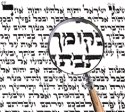
02.17.17 (Shevat 21, 5777) The Scriptures declare: "Blessed is the man who ... delights in the Torah of the LORD (בְּתוֹרַת יְהוָה); all that he does shall prosper" (Psalm 1:1-3). And while it is true that we are no longer 'under' the constraints of the former covenant given at Sinai (Rom. 3:20-28), we are repeatedly instructed to delight in the Torah and to meditate on its precepts day and night (Josh 1:8, Psalm 1:2; 19:8; 119:15, 47, 97; Neh. 8:12, etc.). As it is written in Proverbs: "If you seek it [i.e., the wisdom revealed in the Torah] like silver and search for it as for hidden treasures, then you will understand the fear of the LORD and find the knowledge of God" (Prov. 2:4-5). Indeed, the New Testament says that the "the Torah is holy, and the commandment is holy and righteous and good" (Rom. 7:2), and where it is written, "all Scripture is breathed out by God and is profitable for teaching, for reproof, for correction, and for training in righteousness" (2 Tim 3:16-17), it is evident that the Jewish Scriptures (i.e., the Torah, the Prophets, and the Writings) are meant, since they provide the foundation, context, and the overarching matrix for the later New Covenant revelation... And of course these were the Scriptures Yeshua used to explain his ministry to his followers: "And beginning with Moses and all the Prophets, he interpreted to them in all the Scriptures the things concerning himself" (Luke 24:27; John 1:45). In other words, the Torah has both a logical, a linguistic, and a theological priority for understanding the New Testament Scriptures, and the failure to read in context invariably leads to faulty interpretations and doctrinal errors of various kinds. God "breathed out" (θεόπνευστος) his revelation in order, and the message itself must be understood in light of that order (Gal. 4:4-5).
מָה־אָהַבְתִּי תוֹרָתֶךָ
כָּל־הַיּוֹם הִיא שִׂיחָתִי
mah · a·hav·ti · to·ra·te·kha
kol · ha·yom · hi · si·cha·ti

"Oh how I love your Torah;
It is my meditation all the day."
(Psalm 119:97)
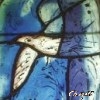
Hebrew Study Card
This verse begins the "Mem section" of the Psalm 119 acrostic (מָה־אָהַבְתִּי תוֹרָתֶךָ). Mem is the letter of "water" (mayim), symbolizing the "spring" of the Torah. In traditional soferut (scribal arts), the letter Mem (מ) is formed from two parts: a Vav (ו) and a Kaf (כ), the gematria of which equals 26, the same value for the sacred Name YHVH (יהוה). The Torah (תּוֹרָה) is central to the revelation of the LORD, just as Yeshua is forever "the Voice of the Living God speaking from the midst of the fire" (Deut. 5:26, Matt. 17:1-3).
Ten Commandments - in Duplicate?

02.17.17 (Shevat 21, 5777) The Ten Commandments are ten "words" or "utterances" (aseret ha-dibrot) that were later inscribed on two tablets of stone (luchot) by the finger of God (Exod. 31:18; 32:15). In the Mekhilta (an early midrashic collection on Exodus, pseudonymously ascribed to Rabbi Ishmael, 90-135 AD), Rabbi Gamaliel is quoted as saying: "How were the Ten Commandments given? Five on one tablet and five on the other. 'I am the Lord' was written across from 'You shall not murder,' but the (earliest) Sages say ten [were written] on one tablet and ten [were written] on the other."
Contrary to the way the commandments are represented by many Christian and Jewish artists, however, the opinion of the earliest sages (i.e., pre-Mishnah interpreters) was that all ten of the commandments written on both of the tablets, a practice similar (but not identical) to other ancient Near Eastern covenants made between kings and their vassals. In other words, the Ten Commandments were given in duplicate form, and both tablets (i.e., copies of the contract) were deposited in the Holy Ark (and later at the Temple) to represent the terms of the agreement for both parties. This is similar to other ancient Near East treaties where one copy was given to the king and the other copy was given to the vassal.
Mirrors of the Law...

02.17.17 (Shevat 21, 5777) One of the reasons God revealed the Ten Commandments was because it was His way of saying, "I know who you really are, I see you..." This is why the people drew back in terror, because they realized that God saw the inner condition of their heart, exposed it, and shined the light of moral truth upon it (Exod. 20:18-21). Nonetheless it is a great and ongoing credit to the Jewish people that they were willing to receive the revelation at Sinai, since it demonstrates that they were genuinely willing to be honest with themselves. Despite their many subsequent failures, they still revered the truth of God's Torah and meticulously preserved the revelation for future generations (Rom. 3:1-2).
There is the "lawful use of the law" (1 Tim. 1:8-11). γνῶθι σεαυτόν -- If we are honest with ourselves, we will acknowledge that we also have the impulse to be faithless, to worship the moment, to cheat, to lie, to lust, to kill, and so on. If you think you can keep the Ten Commandments by your own resolve, it is unlikely you have dared to examine your own inner impulses. If you take the time to do so, you will see these things are there...
The moral law reveals both the holy character of God as well as our inner condition of heart, since its imperatives speak to the need for deliverance. This is the entry point, if you will, because the assumption that the "flesh" can justify itself through its own inner determination must be shattered and broken as were the first tables of stone... It is only after confession and the acceptance of our great need for divine deliverance are we given new hearts to serve God -- no longer as fearful slaves, but as His redeemed children. The genuinely redeemed soul is a "new creation" that inhabits a new realm or "order" of reality (2 Cor. 5:16-17; Gal. 6:15). There is new wine put into new wineskins... Asking a regenerated soul to observe the written law is like asking a post graduate student to go back and take kindergarten classes again. You can review the ordinances, rules, customs, and so on, but ultimately this God wants the inward heart. In other words, "Torah" means something far more than merely the mishpatim, chukkot, and shoftim (laws, decrees, and judgments) revealed in the lawcode revealed to Moses. There is Torat Yeshua, the "yoke" of His teaching that brings you before the Throne of Grace, before the heavenly kapporet, and empowers you to walk according to the law of love by the power of the Holy Spirit. The New Covenant provides both the Source for keeping the inner meaning of the Torah - as well as its true End - in Yeshua, the First and the Last, who is forever the Living Torah....
The law was given as a guardian (παιδαγωγὸς) intended to restrain the evil impulses of the heart until transformation by Messiah would be given to those who believe (Gal. 3:24-25). The problem is not with the law, of course, but with the underlying condition of the heart... What we need is not mere outward conformity but a genuine change of heart - and that is precisely what the New Covenant is all about: spiritual rebirth, a new "heart of flesh," and God-given power to walk in love that transcends the law and its requirements. The law, in other words, was never meant to be an end in itself but only a means to a greater end, namely, the life of love, joy, peace, freedom, and the fruit of the Holy Spirit - "against such things there is no law" (Gal. 5:22-23). The genuinely regenerated soul is a "new creation" that inhabits a new realm or "order" of reality (2 Cor. 5:16-17; Gal. 6:15).
Drawing Near the Cloud...
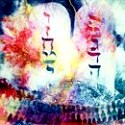
02.17.17 (Shevat 21, 5777) From our Torah for this week we read: "and the people stood far off, while Moses drew near to the thick cloud where God was" (Exod. 20:21). Later, when Moses recalled the awesome revelation of the Torah at Sinai, he described how the mountain of God "burned with fire unto the heart of heaven" (בּעֵר בָּאֵשׁ עַד־לֵב הַשָּׁמַיִם) when the Ten Commandments were uttered and were written upon the two tablets (Deut. 4:11-13). The sages say that the two tablets represented a heart, as it says in the Scriptures, "write them on the tablet of your heart" (Prov. 3:3), and God's word is likened to a fire that reveals the great passion of God's heart for us (Jer. 23:29; Deut. 4:24). Tragically, the two tablets were smashed after the people lost sight of the heart of heaven, and therefore God requires a broken heart - teshuvah - to behold his glory once again. Therefore we see that Yeshua died of a broken heart upon the cross for our return to God, and the fire of his passion burned unto the very heart of heaven....
Finding Inner Peace...

02.17.17 (Shevat 21, 5777) It is one thing to have faith that there is a God who is all-powerful, loving, and so on, while it's another thing altogether to trust that God is your friend and your healer who will take care of you throughout the sojourn of your life (Psalm 16:11; Psalm 23). In the former case, you may cognitively accept true statements of faith, though you may still regard God as distant from your struggles; in the latter case you let go of your fear and experience inner peace by relating to God as your Heavenly Father....
The unbeliever lives a terribly burdensome life, for he refuses to acknowledge that his tribulations are shared by God, and therefore he bears all of life's burdens alone. Not so the person who trusts that God shares his pain and who therefore finds life's burdens much easier to bear. As Yeshua said, "my yoke is good (χρηστὸς) and my burden is light (Matt. 11:30). "The very essence of trust in God (i.e., bittachon) is the serenity it imparts to the one who truly places his trust in Him." As it is written, "You keep him in perfect peace (lit. the "shalom of shalom") whose mind is stayed on you, because he trusts in you:
יֵצֶר סָמוּךְ תִּצּר שָׁלוֹם שָׁלוֹם
כִּי בְךָ בָּטוּחַ
ye·tzer · sa·mukh · titz·tzor · sha·lom · sha·lom
ki · ve·kha · ba·tu·ach

"You will keep him in perfect peace whose mind is stayed on you,
for he trusts in you." - Isa. 26:3

Hebrew Study Card
The first part of the Shema (i.e., Deut. 6:4-9) admonishes us to remember the truth of God "when you sit in your house, when you walk in your ways, when you lie down, and when you rise up." "In all your ways know Him," that is, in all that you put your hand to do look for the God's Presence and guidance (1 Cor. 10:31). This is something you must do: As King David stated, "I have set the Lord always before me, because He is at my right hand, I shall not be moved" (Psalm 16:8). You must "let the peace of God rule in you" (Col. 3:15).
These are the words...

02.17.17 (Shevat 21, 5777) From our Torah portion this week (i.e., parashat Yitro) we read: "You shall be treasured and set apart; you shall be a child of the King; you shall be one who helps others draw near to God... these are the words (אֵלֶּה הַדְּבָרִים) that you shall speak" (Exod. 19:5-6). These are the words of love: "And you shall love the LORD your God with all your heart, with all your soul, with all your substance. Set these words (הַדְּבָרִים הָאֵלֶּה), which I command you this day, upon your heart" (Deut. 6:5-6). We store up these words so that, in a holy moment, they are quickened within us and we are able to hear the Voice of the LORD speaking from the midst of the fire that burns within our hearts. As Simone Weil said, "love is revelation, and revelation comes only with love."
The Deeper Torah...

02.16.17 (Shevat 20, 5777) Strictly speaking the content of the Ten Commandments, from a moral perspective, presented no new revelation, since sacred Reality is intuitively understood within every created soul (see Gen. 1:27; John 1:9; Acts 17:24-28). As it is written, "The wrath of God is revealed from heaven against all ungodliness and unrighteousness of men, who suppress (i.e., hold down: κατέχω) the truth by their unrighteousness, because that which can be known about God is evident within them, for God has revealed it to them" (Rom. 1:18-19). Where Paul says, "against all ungodliness" he refers to our universal duty before the Living God (בֵּין אָדָם לָמָקוֹם); and likewise "all unrighteousness," refers to our universal duty toward other people (בֵּין אָדָם לְחֲבֵרוֹ). The "invisible things of God are seen" so vividly that people are "without excuse" (ἀναπολόγητος) for their evasion and rejection of the Divine Presence, which constitutes a disposition of rebellion, treason, and willful desecration of the sanctity of life (Rom. 1:20). The deeper revelation given at Sinai, however, was not an elaborate lawcode but something else, namely, the solution for the problem of spiritual death as prefigured in the Altar of the Tabernacle and the daily sacrifice of the lamb (i.e., korban tamid: קָרְבַּן תָּמִיד; Num. 28:1-8). "The people stood far off, while Moses drew near to the thick darkness where God was" (Exod. 20:21). The onlookers saw the outer, the imposing, the threatening, and this made them distant, but Moses entered the inner region and was given the vision of the altar (Exod. 25:9; John 5:46-47; Heb. 8:6). Likewise Yeshua did not come to be a moral teacher of the law but to bear the penalty of our lawlessness (2 Cor. 5:21; Gal. 3:13). Our Savior died upon the cross shrouded in complete darkness, yet entering the inner region reveals God's passion offered up for you (Luke 23:44-45).
Lawful Use of the Law...

02.16.17 (Shevat 20, 5777) "For all who are led by the Spirit of God are children of God" (Rom. 8:14). Are you led by the heart of God in your daily life, in the midst of your joys, sorrows, and tribulations? This is essential, after all. Do you live in the freedom of Messiah? If you are led by the Spirit, you no longer labor under the law of sin and death but you are set free to experience a new order of reality (Rom. 8:2). The law is holy, righteous, and good, of course, but it also reveals our lethal spiritual condition (Rom. 7:7-25) and therefore it reveals our great need for a Savior, the Messiah who is the end (τέλος) of the law (Rom. 10:4; Gal. 3:21-24, 4:4-5). Those who advocate "Torah observance" do not understand the divine purpose of the law itself (1 Tim. 1:7), and those who teach the law as the means of finding life "frustrate the grace of God" (Gal. 2:19-21). The "lawful use of the law" demonstrates the holiness of God and serves as a mirror of our sinful condition, but the "unlawful use of the law" seeks righteousness apart from the saving agency of Messiah who (alone) is the "righteousness of God." The end of the commandment is "love that issues from a pure heart and a good conscience and a sincere faith" (1 Tim. 2:5). And just as Yeshua came not for the righteous but for sinners (Mark 2:17), so the law was not given for the righteous, but for those who know they need deliverance from the power of indwelling sin (Rom. 3:20, 7:7).
Note: For more on this essential topic, see "The Lawful Use of the Law."
The "Problem" of Obedience...

[ The following is related to this week's Torah reading (Yitro) and the relationship between surrendering to God (trust) and acts of obedience (works)... ]
02.16.17 (Shevat 20, 5777) The very first duty of the heart is to surrender to God's love for your soul. Surrender of the heart is deeper than outward obedience, since it is possible to obey God for the wrong reasons. Our motivation must be grounded in God's love first of all. This is what it means to "die to yourself" or to be "crucified" with Messiah: you let go; you relinquish control; you trust God to sustain you, even in your weakest moment. That is the nature of trusting in God's love for you.
Some people seem to think that the way of salvation depends on our obedience. But those who say things like we must "trust and obey," or "believe and repent" either do not understand the radical nature of what it means to truly trust God, or they confuse the idea of surrender with obedience. After all, if we seriously think that we are delivered by our obedience, the focus will be on our will, our "works," our performance, and our religious life will become self-centered, driven, and insecure. Moreover, this willful approach assumes we can obey, that we are capable of attaining some kind of spiritual perfection, and so on. No one denies the requirement to obey God, of course, but the question centers on the means to do just that. What is the source of our power to obey God? To remedy matters of self-deception, it is helpful to review the Sermon on the Mount, where Jesus interprets the Ten Commandments to show us what really lurks within the unregenerated heart.
For more on this topic, see "The Problem of Obedience: Further thoughts on Yitro."
The Divine "Law School"...

[ The following is related to this week's Torah reading (Yitro). ]
02.15.17 (Shevat 19, 5777) The sages have said that "the laws of the Torah were given that people should live by them and not that they should die by them" (Lev. 18:5), and while this is true, it is not true without qualification. Legalists and spiritual perfectionists are constantly depressed because they never feel like they've done enough or have fulfilled their duty. They feel inadequate, and this can lead to severity and hardness of heart. However, such spiritual failure serves as a "halfway house" to the truth, since the law was intended to reveal our sinful condition and to lead us to a state of brokenness and deliverance by God's grace (Gal. 3:24-25). As is is written, "For from the law comes the knowledge of sin" (διὰ γὰρ νόμου ἐπίγνωσις ἁμαρτίας), but now the righteousness of God (צִדְקַת אֱלהִים) apart from the law is manifested, being witnessed by the law and the prophets" (Rom. 3:20-21, Gal. 3:19). The phrase "apart from the law" means from an entirely different sphere from that which says, "do this and live." It is the "righteousness" (δικαιοσύνη) that comes from God, not from man. The law by itself, though holy, just, and good, is powerless to give life, though it indeed reveals our need for life that graciously is given apart from the law. Love, then, is the miracle of God that alone gives us life and power us to keep the truth of the law -- its inner meaning -- and that love is found in God the truth of Yeshua the Messiah...
"So then, the law (ὁ νόμος) was our guardian (παιδαγωγὸς) until the Messiah came, in order that we might be justified by faith (ἵνα ἐκ πίστεως δικαιωθῶμεν). But now that faith has come, we are no longer under a guardian, for in Yeshua the Messiah you are all childen of God (בְּנֵי אֱלהִים) through faith. For as many of you as were baptized into the Messiah have put on the Messiah. There is neither Jew nor Greek, there is neither slave nor free, there is no male and female, for you are all one in Yeshua the Messiah. And if you are Messiah's, then you are Abraham's offspring, heirs according to promise.... Therefore far be it from me to boast except in the cross of our Lord Yeshua the Messiah, by which the world has been crucified to me, and I to the world. For neither circumcision counts for anything, nor uncircumcision, but being a new creation (בְּרִיאָה הַחֲדָשָׁה). And as for all who walk by this rule, peace and mercy be upon them, and upon the Israel of God" (Gal. 3:24-29; 6:14-16).
First and last Word...

[ The following is related to this week's Torah reading, parashat Yitro... ]
02.15.17 (Shevat 19, 5777) The Ten Commandments are often divided into two basic categories: those duties we have before God (לָמָקוֹם) and those duties we have before our neighbor (לְחֲבֵרוֹ), though ultimately these are one and the same. As I've written about before, the Commandments begin with the word anochi ("I AM") and end with the word le're'kha ("to/for your neighbor"). Joining these words together says "I am your neighbor," indicating that the LORD Himself is found in your neighbor. The "first and last" word of Torah, then, is simply "I AM your neighbor" (Gal. 5:14; Rom. 13:10). Consequently every social transgression is a transgression against God, and vice-versa. As our Scriptures teach, "If anyone says, "I love God," and hates his brother, he is a liar," and "love fulfills the law" (1 John 4:20; Rom. 13:8). When we (by the miracle of heavenly grace) genuinely love our neighbor as ourselves (אָהַבְתָּ לְרֵעֲךָ כָּמוֹךָ), we are in effect showing love for the LORD. And may it please God to help us receive His heart so that we can extend the the truth of his love to all whom we encounter, chaverim...
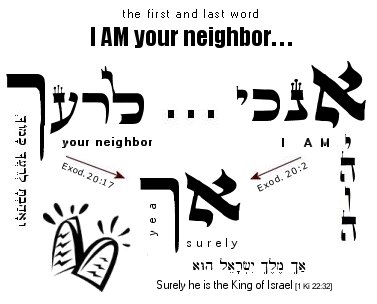 |
Where do you live?
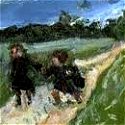
[ The following is related to this week's Torah reading, parashat Yitro... ]
02.15.17 (Shevat 19, 5777) A governmental clerk once asked me where I lived, and I answered in terms of a physical address - a city, street name, house number, and so on. "Where we live" is usually defined by locating ourselves on a map of some kind, pointing to some physical place. Spiritually-speaking, however, "where we live" resolves to a cluster of philosophical questions about the significance of our lives, about how we choose to interpret our experience, about how we direct our focus, about what we regard as ultimately real, and so on. The Ten Commandments begin: "I AM the LORD your God" (אָנכִי יְהוָה אֱלהֶיךָ), which teaches us that the whole Torah was spoken to enable us to say that where we live is before the Divine Presence in all our ways....
Our Daily Bread...
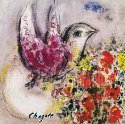
02.15.17 (Shevat 19, 5777) Then the LORD said to Moses, "Behold, I am about to rain bread from heaven for you, and the people shall go out and gather a day's portion every day, that I may test them (לְמַעַן אֲנַסֶּנּוּ), whether they will walk in my Torah or not (Exod. 16:4). Note first that this commandment came before the Sinai revelation and therefore concerns the deeper Torah of trust that our father Abraham understood (Gen. 26:5). You may cognitively believe that God is real, the Almighty, and so on, but you may still stumble over the volitional and emotional issue of bittachon (i.e., trust)... Your faith may believe in the possible, but only trust receives the blessing, accepting the daily portion without anxiety over the future (Matt. 6:34). Every day we are given bread from heaven (לֶחֶם מִן־הַשָּׁמָיִם), but we must remember it may not be stored without becoming rotten (Exod. 16:20).
וַיַּמְטֵר עֲלֵיהֶם מָן לֶאֱכל
וּדְגַן־שָׁמַיִם נָתַן לָמוֹ
va·yam·ter · a·le·hem · man · le·e·khol
u·de·gan · sha·ma·yim · na·tan · la·mo

"He rained down on them manna to eat
and gave them the grain of heaven."
(Psalm 78:24)
The LORD your Healer...
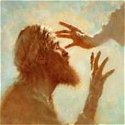
02.15.17 (Shevat 19, 5777) "For I am HaShem your Healer" (כִּי אֲנִי יְהוָה רפְאֶךָ). This is the deeper meaning of the Exodus, when we encounter our own bondage and brokenness. There are times when you may find yourself very ill or in desperate need, and your prayers are intensified for deliverance. The LORD then brings recovery and speaks to your heart: "I am HaShem your Healer" (Exod. 15:26).
Torah of Willingness...
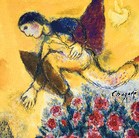
[ The following is related to this week's Torah reading, Parashat Yitro... ]
02.14.17 (Shevat 18, 5777) Do you need to understand before you will believe? The midrash says that God offered the Torah to each the 70 nations, but each nation first asked to understand what was required, and then rejected the offer... Finally God approached Israel and asked: "Will you accept my Torah?" And they replied, kol asher dibber Adonai na'aseh (כּל אֲשֶׁר־דִּבֶּר יְהוָה נַעֲשֶׂה), "all that the LORD has spoken we will do" (Exod. 19:8). In other words, Israel was willing to accept the Torah even before they understood what was required of them. Later they reaffirmed their simplicity of heart by saying na'aseh ve'nishma: "We will do and then we will understand" (Exod. 24:7). Faith is first of all a matter of heart, of gratitude, and responding to God's invitation. All the "externals" of the Sinai experience - the fire, the smoke, the blasts of the shofar - were known in the deeper fire, smoke, and soundings of the heart of faith.
First we learn to trust Him, and then we learn to walk with Him... in that order.
In Every Generation...

[ The following is related to this week's Torah reading, Parashat Yitro... ]
02.14.17 (Shevat 18, 5777) Jewish tradition says all Jews were present at Sinai – not just the Israelites who had come from Egypt – but all subsequent generations as well (Deut. 29:14-15). Covenant unites us as a people, since the words of revelation were given to all gathered at the mountain, and yet the words themselves are spoken directly to the individual: "I AM the LORD your God" is heard in the singular (אָנכִי יְהוָה אֱלהֶיךָ), and therefore the first commandment is to receive God's "I AM" into your consciousness and heart... So while we all have a shared experience of Sinai – the awe of transcendence, the inner conviction of moral truth, the affirmation of values, and so on – what each person does with these intuitions is unique, and therefore each soul is bound to search out the meaning of the words and to choose how to live. We are, each of us, in this process together, and therefore we can share our wisdom along the way, though ultimately we are personally responsible for the hope we carry. Each of us is given a unique place in the heart of God, though we are part of a community that together hears the Voice "from the midst of the fire." We are each connected to God our Source, to one another, and to all of creation.
The story of Exodus is not the story of "other people." You must choose to belong. Your faith draws you near. That is why the sages teach: b'chol dor vador - in each and every generation an individual should look upon him or herself as if he or she (personally) had left Egypt. It's not enough to recall, in some abstract sense, the deliverance of the Jewish people in ancient Egypt, but each Jew is responsible to personally view Passover as a time to commemorate their own personal deliverance from the bondage of Pharaoh. The same must be said regarding Shavuot. Each person should consider himself as having personally received revelation at Sinai. The altar of the Mishkan was set up for you to draw near to God - you, not some people who lived long ago... This is why non-Jews who turn to the God of Israel by putting their trust in the Messiah are regarded equal members in the covenants and promises given to ethnic Israel. It is a brit milah (בְּרִית מִילָה) - literally, a "covenant of the word" - that makes us partakers of the covenantal blessings given to Abraham (Eph. 2:12-19; Gal. 3:7; Col. 2:11, etc.)...
Torah of Faith...

[ The following is related to our Torah for this week, Parashat Yitro, and the giving of the Ten Commandments at Sinai in particular... ]
02.14.17 (Shevat 18, 5777) When asked how many commandments are in the Torah, most Jews will answer 613, based on Jewish tradition (the number 613 is sometimes called "taryag" (תריג), an abbreviation for the letters Tav (400) + Resh (200) + Yod (10) + Gimmel (3) = 613). Despite several attempts made over the centuries, however, there has never been a definitive list of these commandments, and of those who tried to compile such, no two agree... Some say the number 613 comes from a fanciful midrash that teaches that since there are 365 days in a year (corresponding to the 365 negative commandments) and 248 "parts" of the body (corresponding to the positive commandments), each day we should use our body to serve God. Regardless of the exact count, however, the Talmud followed the Apostle Paul by understanding all the Torah's commandments to be derived from the Ten Commandments given at Sinai, the most basic of which is the very First Commandment, namely, "I AM the LORD your God (אָנכִי יְהוָה אֱלהֶיךָ) who brought you out of Egypt, out of the house of slavery" (Exod. 20:2). This foundational commandment was later restated by the prophet Habbakuk as: וְצַדִּיק בֶּאֱמוּנָתוֹ יִחְיֶה / "The righteous person will live by faith in God" (Hab. 2:4; Gal. 3:11; Heb. 10:38).
Note: I stated that the sages of the Talmud "followed" the Apostle Paul's line of thinking on this subject since Rabbi Paul wrote centuries before the Talmud was compiled... And incidentally, the New Covenant Scriptures are not without the imperatives of "Torah," of course, with some people counting over 1,000 distinct commandments in its pages...
Torah of the Neighbor...

[ The following is related to this week's Torah reading, Parashat Yitro... ]
02.13.17 (Shevat 17, 5777) The Ten Commandments are often divided into two basic groups or categories. The first five commandments are said to be "between man and God" (i.e., ben adam le'chavero: בֵּין אָדָם לְחֲבֵרוֹ), and contain 146 words; whereas the second five are said to be "between man and other people" (i.e., ben adam la'Makom: בֵּין אָדָם לְמָקוֹם), and contain 26 words, the same value as the Name of God, YHVH (יהוה). In this connection we note that the Ten Commandments begin with "I AM" (אָנכִי) and end with "[for] your neighbor" (לְרֵעֶךָ), which when joined together says, "I AM your neighbor." In other words, the LORD Himself is also found in your neighbor... When we love our neighbor as ourselves (אָהַבְתָּ לְרֵעֲךָ כָּמוֹךָ), we are demonstrate our love for God. But who, then, is your neighbor? You are -- to every other soul you may encounter this day (Luke 10:36).
Note: I should add that loving others is impossible without first receiving (inwardly accepting and making your reality) who you are as the "beloved of the Lord..." You have to start there, since you can't give away what you don't have. If you struggle with loving others, or are a cynic, a misanthrope, a jaded soul, or are wounded or bitter of heart, then first find your heart's healing and then simply live honestly before others... May God help each of us!
Ten Matters of Heart...

[ The following is related to this week's Torah reading, Parashat Yitro... ]
02.13.17 (Shevat 17, 5777) The Ten Commandments of Torah (עֲשֶׂרֶת הַדִבְּרוֹת) may be summarized this way: 1) "I AM your only deliverer, the One who loves and chooses you; 2) love me exclusively; 3) regard my love as sacred; 4) rest in me; 5) honor your life and its history. Do no harm to others: 6) forsake anger, 7) abandon lust, 8) renounce greed, and 9) abhor lying, and 10) refuse envy. Know that you belong to me and that you are accepted. Love others as you are also loved..."
The "heart of the law" is the Torah of love, just as the "law of love" is the Torah of the Gospel (John 15:12). "Teach me the whole Torah, a heathen said, while I stand on one foot. Shammai cursed and drove the man away. He went to Hillel. Hillel said, What is hateful to you, do not do to anyone else: that is the whole Torah. The rest will follow – go now and learn it." As the Apostle Paul taught: "For the whole law is fulfilled in one word: Ve'ahavta: "You shall love your neighbor as yourself" (Gal. 5:14). Love does no wrong to a neighbor; therefore love is the fulfilling of the law" (Rom. 13:10).
Rabbi Levi said, "When the Holy One spoke to the people of Israel, each one felt personally spoken to by God, and thus it says in the singular, 'I am the Eternal One, your God.'" Indeed the very first commandment given at Sinai was to accept the reality of our personal deliverance by the LORD: "I am the LORD your God, who brought you (singular) out of the land of Egypt, out of the house of slavery" (Exod. 20:2). In fact, God used the second person singular (not plural) for all the verbs throughout the Ten Commandments: "you (singular) shall have no other gods beside me"; "you (singular) shall not take the Name of the LORD your God in vain," and so on. The very first commandment, however, is the starting point for all that follows. Until you accept the LORD as your God and to trust Him as your own Deliverer, the rest of the commandments are not likely to be heeded.
Note: "Now the goal of the commandment is love (τὸ δὲ τέλος τῆς παραγγελίας ἐστὶν ἀγάπη) from a pure heart and a good conscience and a sincere faith, though some people, having strayed away, have turned instead to vain talk, desiring to be teachers of the Torah but without understanding either what they are saying or the things about which they make confident assertions" (1 Tim. 1:5-7). If your understanding of Torah and the meaning of the Ten Commandments (עֲשֶׂרֶת הַדִבְּרוֹת) doesn't lead you directly to God's love, you have made a seriously wrong turn... For more on this subject, click here.
The First Commandment...

[ The following is related to this week's Torah reading, parashat Yitro... ]
02.13.17 (Shevat 17, 5777) Rabbi Levi said, "When the Holy One spoke to the people of Israel, each one felt personally spoken to by God, and thus it says in the singular, 'I am the Eternal One, your God.'" Indeed the first commandment at Sinai was to accept the reality of our personal deliverance by the LORD: "I am the LORD your God (אָנכִי יְהוָה אֱלהֶיךָ), who brought you (singular) out of the land of Egypt, out of the house of slavery" (Exod. 20:2). In fact, the Hebrew text of the Torah reveals that God used the second person singular (not plural) for all the verbs throughout the Ten Commandments: "you (singular) shall have no other gods beside me"; "you (singular) shall not take the Name of the LORD your God in vain," and so on. The very first commandment, however, is the starting point for all that follows. Until you are personally willing to accept the LORD as your God and to trust Him as your own Deliverer and King, the rest of the commandments are not likely to be heeded.
אָנכִי יְהוָה אֱלהֶיךָ
אֲשֶׁר הוֹצֵאתִיךָ מֵאֶרֶץ מִצְרַיִם
מִבֵּית עֲבָדִים
a·no·khi · Adonai · E·lo·he·kha
a·sher · ho·tze·ti·kha · me·e·retz · mitz·ra·yim
mi·bet · a·va·dim

"I am the LORD your God,
who brought you out of the land of Egypt,
out of the house of slavery"
(Exod. 20:2)
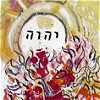
Hebrew Study Card
It is noteworthy that God began with the phrase asher hotzetikha me'eretz mitzrayim ("who delivered you from the land of Egypt") instead of identifying Himself as the Creator of heaven and earth (Gen. 1:1). This is because the purpose of creation is to demonstrate God's redemptive love and to be known as our Savior and Redeemer, just as Yeshua is the "Lamb slain from the foundation of the world" (Rev. 13:8; 1 Pet. 1:18-20; Eph. 1:4; 2 Tim. 1:9). "All things were created by Him (i.e., Yeshua), and for Him" and in Him all things consist (συνεστηκεν, lit. "stick together") (Col. 1:16-17). Creation therefore begins and ends with the redemptive love of God as manifested in the Person of Yeshua our Mashiach, the great Lamb of God... He is the Center of Creation - the Aleph and Tav - the Beginning and the End (Isa. 44:6; Rev. 1:17). All the world was created for the Messiah: "For from him and through him and to him are all things. To him be glory forever. Amen" (Rom. 11:36).
In more general terms, Torah mentions the Exodus from Egypt rather than the creation of the world because the call to know divine truth goes beyond the realm of the natural realm, olam ha'zeh. The law speaks to the transcendental and spiritual aspect of humanity, and is therefore understood in relation to liberation from slavery to this-worldly thinking… Negatively the law serves as a "guardian" from unbridled impulses of the lower nature, though positively it reveals the sanctity of life and its intrinsic holiness...
The Law and the Spirit...

[ The following is related to this week's Torah reading (Yitro). Please read the Torah portion to "find your place" here. ]
02.12.17 (Shevat 16, 5777) "On the first day of the third month after leaving Egypt, the people of Israel came to the desert of Sinai" (Exod. 19:1). The revelation at Sinai is celebrated each year during the festival of Shavuot ("Weeks"), which occurs exactly seven weeks (49 days) after the Passover (because of this, Shavuot is sometimes called "Pentecost," meaning "the 50th day"). The 49 day countdown from the day after Passover was later commemorated as the period of "counting the omer." In Jewish tradition, Shavuot is called the "time of the giving of our Torah," the culmination of the Passover deliverance, though it is also the time when the Holy Spirit) was poured out to the followers of Yeshua in fulfillment of the promised New Covenant (Acts 2, Jer. 31:31-33). Note carefully that the advent of the Spirit occurred after the resurrection of Yeshua from the dead, which implies that the festivals of the LORD were not restricted to the "old testament" economy, but on the contrary, the New Covenant was intended to impart the revelation of Torah within the heart, as it says: "I will give my Torah within them (נָתַתִּי אֶת־תּוֹרָתִי בְּקִרְבָּם) and on their hearts I will write it" (Jer. 31:33; Heb. 8:10; 10:16).
Fruit of our Words...

02.12.17 (Shevat 16, 5777) Yeshua said that as a tree is to its fruit, so is a person's heart is to his speech. Our words arise from an underlying source and root: "I tell you, on the Day of Judgment people will give account for every careless word (πᾶν ῥῆμα ἀργὸν) they speak, for by your words you will be justified, and by your words you will be condemned" (Matt. 12:36-37). First note that the phrase translated "every careless word" can be understood as "every 'workless' word," that is, every vain or empty word spoken, every broken promise, every insincere utterance, and so on. Second, note that there is a relationship between naming and being in Hebrew thought, and indeed the Hebrew word davar (דּבר), usually translated as "word," can also mean "thing." This suggests that our words define reality - not in an absolute sense, of course - but in terms of our perspective and attitude, and for that we are held responsible before the LORD. Since our words express our thoughts, Yeshua wants us to make up our minds: "Either make the tree good and its fruit good, or make the tree bad and its fruit bad, for the tree is known by its fruit."
Listen to the words of your heart and understand that they are devarim, "things" that are defining the course of your life right now. Our thoughts and words "exhale" the breath of God that was given to each of us. In a very real sense they serve as "prayers" we are constantly offering.... And may it please our gracious and long-suffering LORD to answer the cry of our heart: "Let the words of my mouth and the meditation of my heart be acceptable in your sight, O LORD, my Rock and my Redeemer." Amen.
יִהְיוּ לְרָצוֹן אִמְרֵי־פִי
וְהֶגְיוֹן לִבִּי לְפָנֶיךָ יְהוָה צוּרִי וְגאֲלִי
yi·he·yu · le·ra·tzon · im·rei · fi
ve·heg·yon · lib·bi · le·fa·ne·kha · Adonai · tzu·ri · ve·go·a·li

Let the words of my mouth and the meditation of my heart
be acceptable to You, O LORD, my rock and my redeemer.
(Psalm 19:14)

Hebrew Study Card
Parashat Yitro - יתרו

02.12.17 (Shevat 16, 5777) In our Torah portion for this week (parashat Yitro), Moses' father-in-law Jethro (i.e., "Yitro") heard how the Israelites were delivered from their oppression in Egypt and how they had crossed over the Sea into the land of Midian. He then journeyed to the region of Rephidim where his son-in-law told him all that the LORD had done to Pharaoh and to the Egyptians for Israel's sake. Jethro then proclaimed that the LORD is greater than all other gods, and offered up a sacrifice (Exod. 18:1-12).
Seeing the strain the journey had brought upon Moses, however, Jethro wisely advised his son-in-law to appoint a hierarchy of magistrates and judges to help him govern the people, thereby freeing Moses to be a more effective intercessor before the LORD. Jethro's counsel helped implement a system of justice that became the basis of Jewish social law.
After the third new moon after leaving Egypt (i.e., the 1st day of the month of Sivan), the Israelites encamped opposite Mount Sinai, the place where Moses was initially commissioned. Moses then ascended the mountain, and there God commanded him to tell the leaders that if they would obey the LORD and keep His covenant, then they would be mamlekhet kohanim ve'goy kadosh (מַמְלֶכֶת כּהֲנִים וְגוֹי קָדוֹשׁ) -- a "kingdom of priests and a holy nation." After returning down to deliver this message to the elders, the people responded by proclaiming, kol asher diber Adonai na'aseh ("all that the LORD has spoken, we shall do"). Moses then returned to the mountain and was told to command the people to prepare themselves to experience the presence of God upon the mountain in three days.
According to Jewish tradition, on the morning of the "third day" (i.e., the sixth of Sivan, exactly seven weeks (49 days) after the Exodus), all the children of Israel gathered at the foot of Mount Sinai, where the LORD descended amidst thunder, lightning, billowing smoke, fire, and the voluminous blast of the heavenly shofar. The LORD then declared the foundation of moral conduct required of the people, namely, the Ten Commandments. Because this vision was so overwhelming, the terrified Israelites began beseeching Moses to be their mediator lest they die before the Presence of God. The portion ends as the people stood far off, while Moses alone drew near to the thick darkness where God was.
Torah of Trees...

[ The following is related to the holiday of Tu B'Shevat which begins tonight... ]
02.10.17 (Shevat 14, 5777) The Torah alludes that human life is like "the tree of the field," i.e., כִּי הָאָדָם עֵץ הַשָּׂדֶה, Deut. 20:19), and many people therefore observe Tu B'Shevat as time to assess man's place within creation as well. Since God created the world for a habitation (Isa. 45:18), some have pictured the world itself as a "great tree" with human beings as its fruit. Indeed, Yeshua often used such agricultural images in his parables. For example, he explained that people are known by the "fruits" of their lives (Matt. 7:16-20). He likened the spread of his message in terms of "sowing and reaping" (Matt. 13:3-23) and compared the Kingdom of Heaven to the secret working of a mustard seed (Matt. 13:31-32). Yeshua regarded the world as a "field" for planting with different "types of soil" (Matt. 13:38-43), and warned of the "great harvest" of souls at the end of the age (Luke 10:2; Matt. 13:30). He pointed to signs from a fig tree to indicate the nearness of the prophesied End of Days (Matt. 24:32-33). Yeshua also used the metaphor of a "vine and its branches" to explain how his followers are to be connected to Him (John 15:1-6).
For more on this subject, see "The Torah of Trees: Further thoughts on Tu B'Shevat."
The Gift of Faith...

02.10.17 (Shevat 14, 5777) From our Torah for this week (i.e., parashat Beshalach) we read: "Israel saw the great power that the LORD used against the Egyptians, so the people feared the LORD, and they believed in the LORD and in his servant Moses" (Exod. 14:31). Here the sages note that even though the Israelites had seen so many great miracles from God's hand, they still needed faith... Faith is more than witnessing the miraculous, but trusting that the miraculous is for you. Therefore we walk by faith and not by sight, as we look not to the things that are seen but to the things that are unseen. For the things that are seen are transient, but the things that are unseen are eternal (2 Cor. 4:18, 5:7). God opens our eyes so we can see. We do not exercise faith to receive God's help, we receive God's help to exercise faith. The LORD saved Israel, and then "they believed in the LORD."
Righteousness of God...

02.10.17 (Shevat 14, 5777) It has been wisely said that there are two ways to be fooled. One is to believe what isn't true; the other is to refuse to believe what is true. Hence we see that thinking that you are spiritual when you really are not is to deceive yourself, but so also is thinking you are not spiritual when you really are. In the former case you are a hypocrite, but in the latter case you are a person of little faith... If you are willing to honestly examine the status of your spiritual life, see whether you are trusting in your own will to believe, or your own obedience to the moral law, etc., or whether you are trusting in the Reality and power of the resurrected Savior to give you life from the dead... Do you tend to regard the concept of the "righteousness of God" (δικαιοσύνη θεοῦ) to be more about the holy standards of God, or more about the divine love that condescends to impart healing and life to those who are lost, dying, and outside?
Many of us have learned from repeated failures that "the power of sin is in the law" (1 Cor. 15:56), that is, in the unjustified pride of the flesh (ego) that attempts to validate or justify itself. The business of working on yourself, excusing yourself, defending yourself, and so on runs so deeply that Paul calls it the "law of sin and death" (תּוֹרַת הַחֵטְא וְהַמָּוֶת). Often we have to keep revisiting the same sins over and over until the message sinks in and we begin to "get it." Only God Himself knows how many iterations are needed, but the flesh "dies hard" and therefore we keep attempting to find our identity, worth, and merit "under the law." Living under the law, understood here as the principle of self-justification, however, invariably leads to failure, guilt, and the need for further self-justification. The solution to this ever-turning "wheel of sorrow," this infinite and self-defeating "loop," is the righteousness of God that comes "apart from the law" (χωρὶς νόμου), - though the Law and the Prophets bear witness to it (Rom. 3:21). This is the righteousness of God that mercifully ends our relationship to the law (i.e., the covenant of works) by means of the new covenant of grace, so that we may be empowered by the Spirit to bear fruit for God (Rom. 7:1-6; Gal. 2:19-21).
Believing and Seeing...
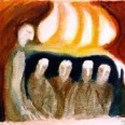
[ The following is related to this week's Torah reading, parashat Beshalach... ]
02.10.17 (Shevat 14, 5777) Despite all the miracles and wonders performed on behalf of the Israelites, the people soon seemed to "forget" about their miraculous redemption. Indeed, it was just a few days after the awe-inspiring deliverance from Egypt that the people began to murmur, complain, and "kvetch" (Exod. 16:1-3). Such discontent warns us that miracles are never enough to sustain faith: Seeing isn't believing, but rather the other way around. This explains why those church groups that emphasis "signs and wonders" often contain so many exhausted people. Miracles are insufficient for faith; people get excited about them while they occur, but they soon forget them and return to a state of desperation and despair. Necessarily the cycle must repeat itself, with ever-increasing claims of the miraculous, in order to keep the movement going. In light of this, it is wise to regard the desire for "signs and wonders" as a counterfeit of the real need to surrender and serve God. After all, to truly love the LORD with all your heart, with all your soul, and with all your strength - now that is a miracle of a greater kind than that of splitting the Sea...
Note: It's been said that all the signs and wonders performed during the Exodus served two purposes: 1) to convince the Egyptians of the greatness of God, and 2) to convince the Israelites of the same thing... An even greater blessing, however, is to trust in the LORD without the need for signs and wonders (John 20:29). May the LORD God of Israel help us live by true bittachon (בִּטָּחוֹן) - trusting in Him and rejoicing in His salvation. Amen.
For more on this, see "Believing and Seeing: Further Thoughts on Parashat Beshalach."
Made Alive in the Spirit....

02.10.17 (Shevat 14, 5777) Yeshua said, "I tell you the solemn truth, unless a person is born anew - from above (ἄνωθεν) - he cannot see the kingdom of God." Nicodemus objected and asked, "How can a man be born when he is old? Can he enter a second time into his mother's womb and be born?" (John 3:3-4). Nicodemus had trouble visualizing spiritual reality and therefore reverted to categories of the natural. However, the "ordinary" way of seeing is deeply affected by habit, and therefore it resists the invitation to see the extraordinary, to open the heart and mind, and to let go of the "great possessions" of prejudice. Sadly, many people seem to prefer the comfort of not thinking, not seeing, and not believing over the "discomfort" of being jarred awake to face reality. Yeshua calls out to those who are willing to hear: "Come to life; be born in the Spirit, awaken, O soul, and come out from your tomb..." (John 11:43-44). May God quicken these words to your heart.
New Heart and Spirit...
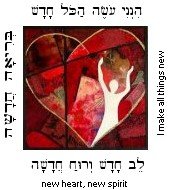
02.10.17 (Shevat 14, 5777) Purity of heart is to will the glory of God in all things, which means learning to be awake and attuned to Sacred Reality. Whatever you do, purpose within to please your Creator first, as it is written: "whether you eat or drink, or whatever you do, do all to the glory of God," and "seek first the Kingdom of God and his righteousness" (1 Cor. 10:31; Matt. 6:33). Heartfelt service for the sake of heaven flows from knowing God in all your ways (Prov. 3:6). We must be careful not to serve God for the sake of reward or self-satisfaction, however, since these ulterior motives are grounded in the ideals of this world. Instead, understand that your greatest treasure is found through "bittul hayesh," or mortification of the self (Rom. 6:11; 8:13; Col. 3:5) and by identifying your life with the heart and passion of the Lord. If you want to be "great" in the kingdom of heaven, you must forget yourself and learn to be present for the sake of others (Matt. 20:26). This is the essence of all true Torah, since the end of Torah is love for others (Gal. 5:14; Rom. 13:8).
Live by the Spirit...

02.10.17 (Shevat 14, 5777) "This I say then, live by the Spirit, and you will not be enslaved to the compulsions of the lower nature. For the compulsions of the lower nature are against the Spirit, but the freedom of the Spirit is against the lower nature. These principles are mutually exclusive, creating self-conflict and instability, and keeping you from living a life of real freedom and joy. If you live by the Spirit, however, you will be set free from the chaos of the lower nature and its inner conflict" (Gal. 5:16-19). We escape temptation by choosing to elevate our thinking, by directing our focus toward God in prayer and supplication, and regarding ourselves as spiritual beings that bear eternal significance. This is the way of spirituality (רוּחָנִיוּת), for where the Spirit of the LORD is present, there is liberty (2 Cor. 3:17). When we feel the pull of the yetzer hara (lower nature), we should pray that God would unify our hearts with divine truth, as it is written: רִגְזוּ וְאַל־תֶּחֱטָאוּ - "tremble and you will not sin" (Psalm 4:4), which means that as our eyes open to the awe of God, we will be humbled before the Sacred Presence, and the enticement of the self will flee from us (James 4:7). Resist the temptation to envy or self-pity; rejoice in the godly struggle against the devices of the lower nature: a pure heart sees the truth of God (Psalm 24:4; Matt. 5:8).
The Heart of Reality...
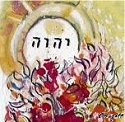
02.10.17 (Shevat 14, 5777) Freedom is a necessary condition for knowing God. Only through liberation are we able to receive the divine inheritance, which is the revelation of God Himself. Therefore it is written: "in thy presence is fullness of joy; at thy right hand there are pleasures for evermore," and "blessed is the one you choose and bring near, to dwell in your courts; we shall be satisfied with the goodness of your house, the holiness of your palace" (Psalm 16:11, Psalm 65:4). The Name of the LORD (יהוה) represents Reality Itself, the Divine Radiance that suffuses all being. All conceptions of God (אלהים) -- all the various titles and descriptions of the divine given in the Scriptures -- analogically reveal aspects of YHVH, the Being of all things, the Centerpoint of Reality, the Essence and Heart of all that is eternally real, true, sacred, and therefore abiding...
Bitterness for Shalom...
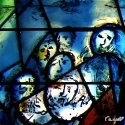
[ The following is related to this week's Torah reading, parashat Beshalach... ]
02.09.17 (Shevat 13, 5777) When the Israelites came to Marah, "they could not drink the water because it was bitter" (Exod. 15:23). Note that the Hebrew text allows us to read that it was the Israelites themselves who were bitter – ki marim hem (כִּי מָרִים הֵם) – "for they (i.e., the Israelites) were bitter," and their bitterness made the water seem so as well.... After the people complained, God showed Moses a tree and threw it into the water, making it drinkable. Note that the Hebrew text literally reads, "the LORD taught him a tree" (וַיּוֹרֵהוּ יְהוָה עֵץ), suggesting elon moreh (אֵלוֹן מוֹרֶה), the "teaching tree of Abraham" (Gen. 12:6). The sages say this tree symbolized Torah, the tree of life (etz chaim), which brings happiness to those who take hold of it (Prov. 3:18), though we see Yeshua, the fallen tree that yields mayim chayim - living water - to revive the hearts of mankind...
הִנֵּה לְשָׁלוֹם מַר־לִי מָר
וְאַתָּה חָשַׁקְתָּ נַפְשִׁי מִשַּׁחַת בְּלִי
כִּי הִשְׁלַכְתָּ אַחֲרֵי גֵוְךָ כָּל־חֲטָאָי
hi·nei · le·sha·lom · mar · li · mar
ve·at·tah · cha·shak·ta · naf·shi · mi·sha·chat · be·li
ki · hish·lakh·ta · a·cha·rei · gev·kha · kol · cha·ta·ai

"Behold, it was for my healing that I had great bitterness;
but You in love have delivered my life from the pit of destruction,
for you have cast all my sins behind your back."
(Isa. 38:17)

In this verse note that the term "pit of destruction" (מִשַּׁחַת בְּלִי) might better be understood as the "pit of wearing out," that is, the pit of nothingness, consumption, vanity, or worthlessness (i.e., belial: בְּלִיַּעַל). The idea is that the LORD loves us "from the pit of nothingness" and speaks to our hearts there. The Hebrew word translated "loved" here (i.e., chashak: חָשַׁק) means to be attached in devotion or affection, or to embrace in kindness... God's great love is like that – it descends into the pit of shame and draws us out from it, just as Yeshua went down to the pit for that purpose – to deliver those trapped in throes of death (Psalm 88:4-6; Zech. 9:11, 12; Heb. 13:20, 2 Cor. 5:12, etc.).
Walking in Faith...

[ The following is related to this week's Torah reading, parashat Beshalach... ]
02.09.17 (Shevat 13, 5777) "The LORD said to Moses, "Why do you cry out to me? Tell the people of Israel to go forward" (Exod. 14:15). There are times when enough prayer has been offered and all that's left is to act. "Tell the people to go forward!" Note well that only after the people began walking in faith was Moses instructed to lift up his staff to divide the waters of the sea so they could pass through...
Amalek and Spiritual Warfare...

02.09.17 (Shevat 13, 5777) In our Torah portion for this week (i.e., Beshalach) we read how "Amalek" attacked the Israelites after they had miraculously crossed over the sea into a new life of freedom (Exod. 17:8). Spiritually speaking the Amalekites aligned themselves with the wicked Pharaoh of Egypt and therefore they sought to continue the war against God's people. Apparently the Amalekite clan in Canaan was founded by a grandson of Esau (Gen. 36:12,16), though Amalek is also listed as the "first among the nations," a man who even predated the time of Abraham (Num. 24:20, Gen. 14:7). In Augustine's terms, Amalek represents the "City of the World," whereas Israel represents the "City of God."
In Jewish tradition, Amalek represents pure evil, or those who have "given themselves over" to Sitra Achra, the side of impurity. Indeed the name Amalek (עֲמָלֵק) begins with the letter Ayin (symbolizing the eye) and equals 240 in gematria -- the same value for safek (סָפֵק), meaning "doubt," and for rahm (רָם), meaning "haughty." Amalek therefore represents "the evil eye of doubt," or even "the severed eye" (i.e., when you remove Ayin from "Amalek," you are left with malak (מָלָק), a verb that means "to chop off" or to sever). Understood in this way, Amalek represents spiritual blindness acting arrogantly in the world, and therefore the LORD vowed perpetual warfare against Amalek: "The Hand is on God's throne. God shall be at war with Amalek for all generations" (Exod. 17:16).
The Torah reveals that we must "go out and fight" Amalek, which is a call to ongoing spiritual warfare in our lives (Deut. 25:17-19). When Moses raised his hands in battle against the Amalekites, the Israelites prevailed, but if he lowered them, they suffered defeat (Exod. 17:11). Eventually Moses grew weary and needed Aaron and Hur to help him hold his arms steady to ensure victory (Exod. 17:12). Note that the Hebrew word translated "steady" is emunah (אֱמוּנָה), the word for faith... It was Moses' steady faith in God's power that gave Israel the victory over the powers of darkness, just as we lift up our faith in God's power demonstrated at the cross gives us the victory over Satan and his schemes.
For more on what Amalek represents, see the article, "Warfare with Amalek."
Heeding Love's Call...

02.08.17 (Shevat 12, 5777) The great commandment is always Shema - listen - and heed God's Voice: "And your ears shall hear a word behind you, saying, "This is the way, walk in it," when you turn to the right or when you turn to the left (Isa. 30:21). At any given moment of our day, then, we can attune ourselves to hear the "upward call" and come "boldly before the Throne of Grace" (Heb. 4:16). The world knows nothing of this realm and is enslaved by appearances and the delusions of this realm, olam hazeh. As Yeshua said, "To you it has been given to know the mysteries of the kingdom of heaven, but to them it has not been given" (Matt. 13:11). The Spirit always says, "Come, my people, enter your chambers, and shut your doors behind you" (Isa. 26:20). The LORD beckons: "Call to me and I will answer you, and will tell you great and hidden things that you have not known" (Jer. 33:3). And I looked, and behold, a door standing open in heaven! And the first voice, which I had heard speaking to me like a trumpet, said, "Come up here, and I will show you..." (Rev 4:1). The repeated or "double call" of heaven is the voice of love. The Beloved calls out to the beloved: "Arise, my love, my beautiful one, and come away" (Song 2:10, 2:13).
The Rock of Reality...

02.08.17 (Shevat 12, 5777) Followers of Yeshua no longer find their identity in this world but rather through their spiritual union with their ascended LORD (Gal. 2:20; 6:14; Eph. 1:3; 2:6)... Therefore we are instructed to "seek the things that are above (τὰ ἄνω ζητεῖτε) where the Messiah is seated at the right hand of God; focus your thoughts on the things above - not on things here on earth - for you have died, and your life has been hidden (κέκρυπται) with Messiah in God. When the Messiah, who is your life, appears, you too will appear with him in glory" (Col. 3:1-4). It is a spiritual decision to "seek first the kingdom of God" (Matt. 6:33), which means that we must attach ourselves to God, esteeming the unseen and the eternal as more real than the seen and the temporal (2 Cor. 4:18). Turn away from worldly news and gossip; these affairs are empty, vain, and devoid of ultimate significance and instead consciously redirect your thoughts toward heaven. Understand that you belong to God and that your true home is in the world to come. Affirm this truth over and over until it becomes a part of your daily soul... Put away from you the "old nature" – all those labels and judgments that used to define you - and open your heart to the radiance and peace of God instead (Col. 3:15). As it is written: "You will keep him in perfect peace (שָׁלוֹם שָׁלוֹם) the one who leans on you, because he trusts in you. Trust in the LORD forever, for Yah the LORD (יָהּ יְהוָה) is everlasting strength" (Isa. 26:3-4).
יֵצֶר סָמוּךְ תִּצּר שָׁלוֹם שָׁלוֹם
כִּי בְךָ בָּטוּחַ
בִּטְחוּ בַיהוָה עֲדֵי־עַד
כִּי בְּיָהּ יְהוָה צוּר עוֹלָמִים
yei·tzer · sa·mookh · tee·tzohr · sha·lom · sha·lom
kee · ve·kha · ba·too·akh
beet·khu · vadonai · ah·dey-ad
kee · be·Yah · Adonai · tzoor · oh·lah·meem

"You will keep in perfect peace the one who leans you,
because he trusts in you. Trust in the LORD forever,
for in Yah the LORD is everlasting strength." (Isa. 26:3-4)

Hebrew Study Card
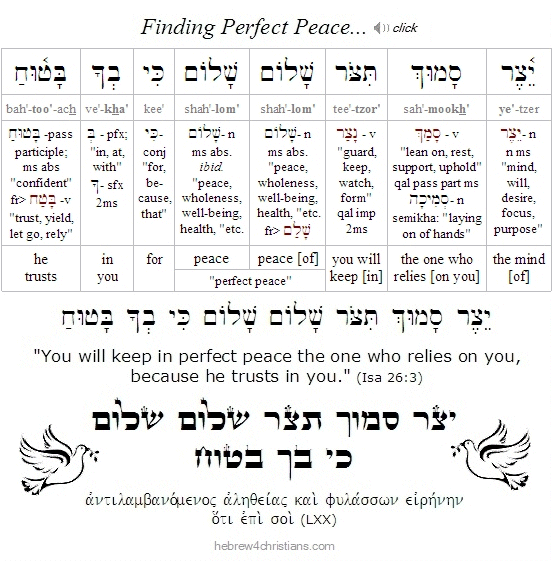
So have you heard the "upward call of God in Yeshua the Messiah" (Phil. 3:14)? This "upward call" (τῆς ἄνω κλήσεως) is the invitation from above, the sound of the heavenly Voice, beckoning you to enter the "high country" of the world to come. As Yeshua said, "I am from above (ἐγὼ ἐκ τῶν ἄνω)." Our true identity is not found in this world and its vain philosophy. The cross brings these things to an end, as we "cross over" from the realm of the dead to the realm of life (Gal. 6:14). Can you say: "I have been crucified with Messiah. It is no longer I who live, but Messiah who lives in me. And the life I now live in the flesh I live by faith in the Son of God, who loved me and gave himself for me" (Gal. 2:20)?
Stepping out in Faith...

[ The following is related to this week's Torah reading, parashat Beshalach.... ]
02.08.17 (Shevat 12, 5777) From our Torah this week (i.e., parashat Beshalach) we read how Israel was trapped before the sea with no way of escape... Moses then cried out to God who told him to march forward -- right into the waters -- as the Pillar of Cloud settled between the people and Pharaoh's advancing army. According to a well-known midrash, when Moses lifted his staff to divide the sea, at first nothing happened. The people waited anxiously at the seashore, wondering what to do. Finally, Nachshon ben Aminadav, a descendant of Judah (Num. 1:7), waded into the water "up to his nose," and then the winds began blowing to divide the waters (Shemot Rabbah). The great miracle of kriat yam suf - the splitting of the sea - therefore resulted because someone found real courage and took a step of faith: "And the people of Israel went into the midst of the sea on dry ground, the waters being a wall (חוֹמָה) to them on their right hand and on their left" (Exod. 14:22). They marched across the sea all that night (i.e., Nisan 21), under the light of the Shekhinah Glory...
The Talmud says "kasheh le'zavgom ke'kriat yam suf," which means it is more difficult for God to create a marriage than to split the sea. They reason this way because each person needs to take individual action to trust the other. Likewise with God. It is more difficult for God to get us to be in a genuine, trusting relationship with Him than it is for Him to split a sea. Of course the problem is not with God, who is the perfect "husband," but with our adulterous inner nature. It took the LORD a year to deliver Israel from Egypt, but it took Him 40 years to teach Israel to trust in His promises of love. God always awaits our teshuvah - our "answer" - to His invitation before He will reveal more to us. As Yeshua once said to his followers, "I still have many things to say to you, but you cannot bear them now" (John 16:12). Some things about God can only be known by stepping out in faith and surrendering ourselves to Him. (For more on this subject, see "Stepping out in Faith...")
The Taste of Gratitude...
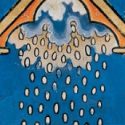
[ The following is related to this week's Torah reading, parashat Beshalach... ]
02.08.17 (Shevat 12, 5777) The LORD said to Moses, "'Look I am going to rain down bread from heaven (לֶחֶם מִן־הַשָּׁמָיִם) for you. The people will go out and gather a portion for that day so that I might test whether they will walk in my Torah (תּוֹרָה) or not" (Exod. 16:4). This miraculous bread was called manna (מָן) because when the people first saw it they asked one other, "mann hu" (מָן הוּא), "what is it?" Although the Torah describes its taste as like "honey cakes" (Exod. 16:31), the midrash says that its taste was a function of a person's sense of gratitude. For those who were thankful for God's care, manna tasted delicious (like a good cookie?), but to those who murmured, it tasted bland and unsatisfying (like stale matzah?). "According to your faith, be it done unto you" (Matt. 9:29).
טַעֲמוּ וּרְאוּ כִּי־טוֹב יְהוָה
אַשְׁרֵי הַגֶּבֶר יֶחֱסֶה־בּוֹ
ta·a·mu · ur·u · ki · tov · Adonai
ash·rei · ha·ge·ver · ye·che·seh · bo

"Oh, taste and see that the LORD is good!
Happy is the man who takes refuge in Him!"
(Psalm 34:8)

Addictions, cravings, lusts, etc., often arise from refusing to be satisfied, by hungering for more than the blessing of the present moment. "My people have committed two evils: they have forsaken me, the fountain of living waters, and hewed out cisterns for themselves, broken cisterns that can hold no water" (Jer. 2:13). The living waters are always present for us, but we will only find them if we open our hearts to the wonder of God in this moment. We must slow down, savor the moment, and see God's hand in everything around us: "Holy, Holy, Holy is the LORD God of Hosts: The whole earth is filled with His glory" (Isa. 6:3). Opening our spiritual eyes will break the cycle of unthinking habit, of "mindless eating," and so on. Ultimately this is another aspect of shema, or listening to your body, your heart, your soul – and especially listening for God's word spoken to your inward being. We can "break the spell" of continual dissatisfaction, of the power of greed, pride, and so on, when we discover that our constant hunger is really a cry for God and His blessing. Our sense of inner emptiness is an invitation to come to the waters and drink life... May God help us to come!
Refusing Despair...
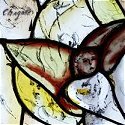
02.07.17 (Shevat 11, 5777) An old Jewish prayer, uttered somewhat wistfully, begins, "O Lord, I know that You will help us; but will You help us before You will help us?" It's not always easy to wait for God, especially when we are in pain or anxiety, but we must never, ever, give up; we must never forget the promise and reality of our ultimate healing in Jesus. Faith expresses hope in the Reality, Substance, and Being (ὑπόστασις) of the Invisible and is made captive to undying hope (Heb. 11:1). Therefore the Spirit cries out: "Hope to the LORD; be strong and strengthen your heart; and (again) hope to the LORD."
קַוֵּה אֶל־יְהוָה חֲזַק וְיַאֲמֵץ לִבֶּךָ
וְקַוֵּה אֶל־יְהוָה
ka·veh · el · Adonai · cha·zak · ve'ya·metz · lib·be·kha,
ve-ka·veh · el · Adonai

"Hope to the LORD; be strong and let your heart be strengthened;
and (again) hope to the LORD"
(Psalm 27:14)

Download Study Card
In this verse, the imperative verb translated "wait" is the Hebrew word kaveh (קַוֵּה), which might better be rendered as "look for with anticipation!" or "hope!" (the same root appears in the Hebrew word for hope, i.e., tikvah: תִּקְוָה). Therefore hope in the Lord and "chazak!" - be strong! (the Septuagint translates chazak as "andridzou" (ἀνδρίζου - act like a man!). Note that the verb ve'yametz is a causal active stem (i.e., Hiphal) in the "jussive mood," which means it is imperative – "command your heart to be strengthened," or "let your heart be made strong!" Make the decision to be strong in the LORD, and the LORD will give you strength to bear your present suffering: "Look to the LORD (קַוֵּה אֶל־יְהוָה) and find hope." Amen. God will help us, and he will help us before he will help us!
Each of us is still upon the "Potter's wheel," though we keep faith that God is molding us and shaping us to reach our end... "Blessed are you, LORD our God, King of the Universe, who walks with the wounded" (שֶׁהוֹלֵךְ עִם הַפְצוּעִים). Amen. "Blessed art You, LORD our God, King of the universe, who makes us captives of hope."
How Long, O Lord?
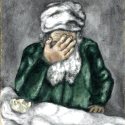
02.07.17 (Shevat 11, 5777) The last promise of Scripture is "I come quickly" (Rev. 22:20), and the last prayer is the antiphon: "Amen, come, Lord Yeshua." Meanwhile we "inwardly groan" for the fulfillment of our redemption: we are suspended between worlds, walking in hope yet subject to the same vanities that befall all flesh. This reminds me of the old story of the Maggid of Brisk who each year would bring proof from the Torah that the Messiah would come that year. Once a certain Torah student asked him, "Rabbi, every year you bring proof from the Torah that the Messiah must come that year, and yet he does not come. Why bother doing this every year, if you see that Heaven ignores you?" The Maggid replied, "The law states that if a son sees his father doing something improper, he is not permitted to rebuke him but must say to him, 'Father, the Torah states thus and so.' Therefore we must tell God, who is our Father, that by keeping us in long exile, he is, in a sense, causing injustice to us, and we must point out, "thus and so it is written in the Torah," in hope that this year he might redeem us." This same principle, of course, applies to those of us who are living in exile and who eagerly await the second coming of the Messiah Yeshua. We should continue asking God to send Him speedily, and in our day, chaverim...
חוּשָׁה לְעֶזְרָתִי אֲדנָי תְּשׁוּעָתִי
choo'·sha · le·ez·ra·tee · Adonai · te·shoo·a·tee

"Make haste to help me, O Lord, my salvation"
(Psalm 38:22)

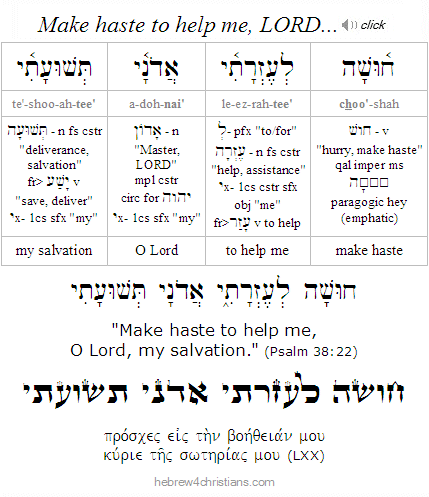
Although God sometime tarries, He declares, "I am the LORD; in its time I will hasten it" (Isa. 60:22). But still the heart sighs, "Is it time, LORD? Will you now restore the kingdom to Israel?" But as Jesus said, "It is not for you to know times or seasons that the Father has fixed by his own authority" (Acts 1:6-7). We are left waiting for ultimate God's answer: His glorious coming to fulfill our salvation. Meanwhile God is faithful "to keep you from falling, and to present you faultless before the presence of his glory with exceeding joy" (Jude 1:24). God will help us before He will help us. May He come speedily, and in our day. Amen.
Affliction and Comfort...

02.07.17 (Shevat 11, 5777) Some of us carry a deep and stubborn pain that refuses to leave us, even after we have poured out our hearts before heaven for deliverance... Perhaps this pain comes from wounds inflicted early in life that have left us feeling betrayed, unsafe, and unsure of the promise love. God knows our struggle. We can find healing when we learn to "own" the pain and make it part of our story, trusting that God will use it to draw us close to him for our good. After all, God is called "the Father of Mercies and God of all comfort" (אַב הָרַחֲמִים וֵאלהֵי כָּל־נֶחָמָה), and the Lord "comforts us" (lit., "calls us to His side," παρακαλέω) in our afflictions so that we may be able to comfort those who are afflicted with the same comfort with which we ourselves are comforted by God (2 Cor. 1:3-4). Take comfort, then, that your Heavenly Father sees when the sparrow falls; he arrays the flower in its hidden valley; he calls each star by name. More importantly, the Lord sees you and understands your struggle. He will never leave you nor forsake you...
הָרפֵא לִשְׁבוּרֵי לֵב וּמְחַבֵּשׁ לְעַצְּבוֹתָם
מוֹנֶה מִסְפָּר לַכּוֹכָבִים לְכֻלָּם שֵׁמוֹת יִקְרָא
ha-ro·fei · lish·vu·rei ·lev · u'me·cha·besh · le'atz·tze·vo·tam
mo·neh · mis·par · la·ko·kha·vim · le·khu·lam · she·mot · yik·ra

"He is the healer of the broken in heart and binds up their wounds;
He counts the number of the stars, he calls them all by name."
(Psalm 147:3-4)

Download Study Card
Brokenness distills the intentions of the heart by helping us to be more honest with ourselves. We begin to realize that we are more vulnerable than at first we thought; that our faith is not as strong as we imagined, and that our motives are often mixed and unconscious. Illusions are striped away; idols crumble; deeper levels of selfishness are uncovered; the gap between our words and our deeds is exposed... It is one thing, after all, to intellectually think about faith or to idealize spirituality, but it is quite another to walk out faith in darkness. Yet it is only there, in the rawness of heart, that we discover what we really believe and how our faith makes traction with reality...
I do not see the road ahead of me, I cannot know for certain where it will end. Nor do I really know myself, and the fact that I think I am following your will does not mean I am actually doing so. But I believe the desire to please you does in fact please you, and I hope I have that desire in all that I am doing. I hope that I will never do anything apart from that desire. And I know that if I do this you will lead me by the right road, though I may know nothing about it. Therefore, I will trust you always, though I may seem to be lost and in the shadow of death. I will not fear, for your are ever with me, and you will never leave me to face my perils alone. - Thomas Merton
Take hope, struggling friend... It is surely the will of God for you to find strength in weakness and comfort in affliction. As our Scriptures promise, "They that wait upon the LORD shall renew their strength; they shall mount up with wings as eagles; they shall run, and not be weary; and they shall walk, and not faint" (Isa. 40:31).
The Tree of Life...

[ The "New Year" for trees is observed on the 15th of Shevat (i.e., Tu B'Shevat), which this year occurs Friday, Feb. 10th at sundown (i.e., this Shabbat)... ]
02.06.17 (Shevat 10, 5777) The Bible begins and ends with the Tree of Life (עֵץ חַיִּים) -- first in the orchard of Eden, and then in the midst of the paradise of heaven. "The Tree of Life (etz ha-chayim) was in the midst of the garden.." (Gen. 2:9). "Then the angel showed me the river of the water of life, bright as crystal, flowing from the throne of God and of the Lamb through the middle of the street of the city; also, on either side of the river, the Tree of Life (etz ha-chayim) with its twelve kinds of fruit, yielding its fruit each month...." (Rev. 22:1-2).
Notice that the "twelve fruits" (καρποὺς δώδεκα) from the Tree of Life are directly linked to the "twelve months" of the Jewish year (κατὰ μῆνα ἕκαστον ἀποδιδοῦν τὸν καρπὸν αὐτοῦ: "each month rendering its fruit"). Twelve months; twelve fruits.... The sequence of the holidays (moedim) were always intended to teach us great revelation about God. That is why God created the Sun and the Moon for signs and for "appointed times" (Gen. 1:14). As it is also written: "He made the moon to mark the appointed times (לְמוֹעֲדִים); the sun knows its time for setting" (Psalm 104:19). Note further that the Majority Text of Revelation 22:14 reads: "Blessed are those who do His commandments (Μακάριοι οἱ ποιοῦντες τὰς ἐντολὰς αὐτοῦ) so that they may have access the Tree of Life..."
עֵץ־חַיִּים הִיא לַמַּחֲזִיקִים בָּהּ
וְתמְכֶיהָ מְאֻשָּׁר
etz · cha·yim · hi · la·ma·cha·zi·kim · bah,
ve·tom·khe·ha · me·u·shar

"It is a tree of life [עֵץ־חַיִּים] to those who take hold of it,
whoever grasps it close will be made happy."
(Prov. 3:18)

Download Study Card
The "Tree of Life" is mentioned ten times in Scripture, corresponding to the "ten words of God." In the Torah it first appears in the center of the paradise of Eden (Gen. 2:9; 3:22-4), but it is soon lost to humanity because of Adam's transgression. In the book of Revelation, it reappears in the center of the Paradise of God (Rev. 2:7, 22:2), resurrected on account of the faithful obedience of Yeshua as mankind's "last Adam" (1 Cor. 15:45). Those who have washed their robes by means of His righteousness are given access to this Tree in the heavenly Jerusalem (Rev. 22:14). The paradise lost by Adam has been regained by the greater ben-adam, Son of man, Yeshua the Messiah, the Savior of the children of men...
It is written in our Scriptures: "Take root downward and bear fruit upward" (2 Kings 19:30; Isa. 37:31). As Yeshua said, "unless a grain of wheat falls to the ground and dies, it abides alone; but if it dies, it produces a big harvest (John 12:24). We pray we might surrender ourselves to the Lord fully, being immersed in His passion, "bearing fruit in every good work (ἐν παντὶ ἔργῳ ἀγαθῷ καρποφοροῦντες) and growing in da'at HaShem (דַעַת אֱלהִים) - the knowledge of God" (Col. 1:10). The "fruit of the righteous is a Tree of Life" lit., etz chayim (עֵץ חַיִּים), literally, "the Tree of lives" (Prov. 11:30). It is the fruit of Yeshua, the Tzaddik of God, the Righteous One, who bears fruits of healing in the lives of those who turn to Him in trust.
Note: If you would like to celebrate Tu B'Shevat with your friends or family, I've created a simplified (and non-Kabbalistic) Tu B'Shevat Seder Guide that will give you some idea about how to perform your own home ceremony. I hope you will find it helpful, chaverim. Blessings to you in Yeshua, our Tree of Life!
Love Story Exodus...

[ The following is related to this week's Torah reading (Beshalach). Please read the Torah portion to "find your place" here.]
02.06.17 (Shevat 10, 5777) When God delivered Israel from Egypt, He did not take them on the fast track to the Promised Land (though He certainly could have done so). No, there was a circuitous route to take, a divinely appointed wandering, a "Divine Stroll of betrothal," if you will. In order to reveal Himself to the Israelites, God had to led them directly into the desert. He embittered waters to make them sweet once again; He let stomachs growl to provide the Bread of life; He parched mouths to give Living Water from the "Rock that was struck" (1 Cor. 10:4). God did all this to reveal to his newly redeemed people that He is the satisfaction of all their longings. For more on this wonderful topic, see "Love Story Exodus."
Heaven's Alphabet...

[ The following is related to this week's Torah reading, parashat Beshalach... ]
02.06.17 (Shevat 10, 5777) A verse from our Torah portion this week (Exod. 16:16) contains all the letters of the Hebrew alphabet (i.e., aleph (א), bet (בּ), gimmel (ג), etc.). The special verse reads, "This is what the LORD has commanded: 'Gather of it, each one of you, as much as he can eat. You shall each take an omer (עמֶר), according to the number of the persons that each of you has in his tent.'" Since this refers to the manna the Israelites were to collect for their daily bread, and this verse contains all the letters of the alphabet, we may poetically infer that if we immerse ourselves in the Scriptures, "from Aleph (א) to Tav (ת)," God will provide us with the "daily bread" (לֶחֶם חֻקֵּנוּ) we need, just as He did when the bread from heaven (לֶחֶם מִן־הַשָּׁמָיִם) was miraculously given to feed the Israelites in the desert. Therefore Yeshua, who is the Aleph and Tav, taught us to pray, "Give us this day our daily bread," which surely refers to the spiritual food (i.e., encouragement, hope, life) that we receive from the Word of Life (Deut. 8:3; Matt. 4:4).
Yeshua taught us: "Don't be anxious about tomorrow, for tomorrow has its own troubles. Live one day at a time" (Matt. 6:34). It makes no sense to worry about the future if the LORD is the Good Shepherd who tenderly watches over your way (Psalm 23:1). Every day we are given daily bread, but we must remember that manna could not be stored up without becoming rotten (Exod. 16:20). God's provision is "sufficient unto the day...."
Isn't it amazing how studying the Hebrew text reveals further insights into the Scriptures? And may you rest in the promise: "My God will supply every need of yours - "from A to Z" - according to his riches in glory in Yeshua the Messiah" (Phil. 4:19). He is lechem ha'chaim - the Living Bread from heaven (John 6:51)!
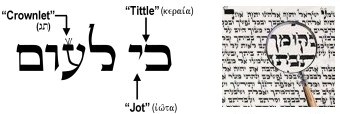 |
Shabbat Shirah - שַׁבַּת שִׁירָה

[ The following concerns this week's Torah reading (Beshalach) and the crossing of the sea... ]
02.05.17 (Shevat 9, 5777) Perhaps the central event of this week's Torah portion is how the LORD split the waters of the sea to make a path for His people to escape from Egypt. This event is commemorated in the great "Song the Sea" (i.e., Shirat Hayam: שִׁירַת הַיָּם), a hymn praising God for His deliverance (see Exod. 15:1-21). Because of its critical significance for the Jewish people, the Sabbath on which this song is chanted is called Shabbat Shirah ("Sabbath of the Song"), and the custom is for all the congregation to rise while it is recited...
The Torah states that when the Israelites entered the sea, it became dry land, with the water as "a wall (חוֹמָה) to their right and to their left" (Exod. 14:29). To commemorate this miracle, the Hebrew text of the "Song of the Sea" is stylized to resemble a "wavy wall," with the words written in alternating "blocks" to suggest a wave of water, like this:
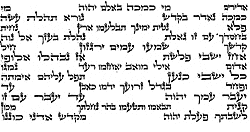 |
The soferim (Torah scribes) count exactly 198 words in this song, which is the numerical value for the word tzchok (צחק), a word that means "laughter" and is the word used to describe Sarah's response when she finally gave birth to Isaac (Gen. 21:6). According to Rabbi Bachya, the laughter in Isaac's name comes from Abraham's joy (Gen. 17:17). The joy of Isaac's birth, then, is linked with the "birth" of the nation of Israel at the time of the Exodus, just as his symbolic death during the Akedah represents Israel's rebirth...
Because it marks deliverance, the Song of the Sea (i.e., the Song of Moses) as well as the "Song of the Lamb" will be sung in the world to come (Rev. 15:3). For more on this, see "The Song of the Sea: Further Thoughts on Beshalach."
Parashat Beshalach - בשלח

[ In our Torah portion this week, the waters of the Red Sea divide to make a path for the Israelites, a miracle that symbolized newness of life as God's liberated people... ]
02.05.17 (Shevat 9, 5777) Last week's Torah portion (i.e., parashat Bo) described how the Israelites were finally delivered from their cruel bondage in Egypt after God issued the decisive plague during the time of Passover. In this week's portion (Beshalach), the Israelites began their journey home, after 430 years of exile. Instead of leading them along a direct route to the Promised Land, however, the LORD directed them south, toward the desert, where the Glory of God appeared as a Pillar of Cloud by day and as a Pillar of Fire by night to lead them on their way. When Pharaoh heard that the Israelites were at the border of the desert, however, he perversely decided to pursue them and bring them back to Egypt. God then redirected the Israelites to camp near the edge of the Sea of Reeds, where the Egyptian army finally caught up with them. Dramatically, the Israelites were caught between the sea on one side, and Pharaoh's army on the other...
The terrified people then began to blame Moses for their predicament. Moses reassured them of God's great deliverance and raised his staff to miraculously divide the waters of the sea. All that night the Shekhinah Glory enshrouded the Egyptian army but gave light to Israel as the people crossed through the sea on dry ground. Just before dawn, the dark pillar of cloud that veiled the Egyptian army lifted, and the soldiers immediately rushed after the Israelites into pathway of the sea. God then told Moses to lift his staff again so that the waters would overwhelm the Egyptians with their chariots and horsemen. By the time dawn arrived, the Israelites saw the dead bodies of Pharaoh's army lining the seashore.
 |
Shabbat Shirah - שַׁבַּת שִׁירָה
Because of the critical significance of the miracle of crossing the sea, this Sabbath is called Shabbat Shirah, the "Sabbath of the Song," because it includes the song of deliverance sung by Moses and Miriam after the people made safe passage to new life. The "Song of the Sea" (i.e., shirah hayam) begins, "The Lord is my strength and song, and he is become my salvation" / עָזִּי וְזִמְרָת יָהּ וַיְהִי־לִי לִישׁוּעָה (Exod. 15:2, cp. Isa. 12:2). For Orthodox Jews, singing Shirat Hayam every day is thought to fulfill the biblical commandment to "remember the day of your departure from the land of Egypt as long as you live" (Deut. 16:3). Note that Shirat Hayam is also sung on the 7th day of Passover, as a memorial of the deliverance by God through the waters of the Sea of Reeds.
Following their jubilation, the narrative resumes as God led the people away from the sea, into the desert of Sin (מִדְבַּר־סִין), a desolate region about midway to Mount Sinai. After traveling three days without finding any water, however, the people complained and God provided them with fresh water at Marah. Awhile later, the matzah the people had brought with them ran out and God tested their obedience by giving them "bread from heaven" (i.e., manna). The portion ends with the Amalekites' surprise attack of Israel at Rephidim, near Mount Sinai, and the introduction of Joshua as the leader of the army of Israel.
Life is in the Blood...

[ The following is related to this week's Torah reading, parashat Bo.... ]
02.03.17 (Shevat 7, 5777) In our Torah portion this week we read about the institution of Passover and the final plague that was to befall the Egyptians on the Passover night. When we think of this time, we may imagine God "passing over" those houses that had the blood of the lamb smeared on their doorposts, though it might better be said that God passed into the homes of those who trusted him, while he withdrew His Presence from those that did not...
To see this note that two different words are used that can be translated as "pass over." First, God said, "I will pass over (i.e., avar: עֲבַר) the land of Egypt that night, and I will strike all the firstborn in the land of Egypt, both man and beast; and on all the gods of Egypt I will execute judgments; I am the LORD" (Exod. 12:12). But directly after saying this, God promised to "pass over" (i.e., pasach: פָּסַח) the homes of those who trusted in him to impart his protection from the plague of death: "The blood shall be a sign for you, on the houses where you are. And when I see the blood, I will pass over to you (lit. עֲלֵכֶם, 'upon you'), and no plague will befall you to destroy you, when I strike the land of Egypt" (Exod. 12:13). In other words, when God would see the blood of the Passover lamb, he would pass over to enter the house and "cover" its occupants from the judgment of death.
The blood of the Passover lamb sheltered people from the plague of death by atoning for their sin by means of a substitutionary sacrifice. The Torah states that "the life (i.e., nefesh: נֶפֶשׁ, or 'soul') of the flesh is in the blood" (Lev. 17:11), and therefore death represents the separation of the soul from the body. The life blood of a sacrificial lamb was therefore offered in exchange for the death and destruction of others. Eating the lamb "roasted by fire" meant identifying with the death offered in exchange for your own; eating matzah, or unleavened bread, signified being delivered in haste, apart from the "rise of the flesh" or human design; and eating maror, or bitter herbs, recalled the bitterness of former bondage.
For more on this topic see: "The Life is in the Blood: Further thoughts on Parashat Bo."
Sequence of the Plagues...

[ The following is related to this week's Torah reading, parashat Bo.... ]
02.03.17 (Shevat 7, 5777) In Parashat Bo we arrive at the successful conclusion of the LORD's campaign to free Israel from bondage in Egypt. Immediately following the description of ninth plague (i.e., the plague of darkness), redemption through the sacrifice of the Passover lamb (קָרְבָּן פֶּסַה) is explained. The Jewish people were saved by the blood of the lamb, just as today we call upon Yeshua as the Lamb of God. Notice that the word בּא ("go") and פרעה ("Pharoah") together equal the gematria of משׁיח ("mashiach"), providing a hint of the coming Messianic redemption that was foreshadowed in Egypt. Every jot and tittle...
Regarding the sequence of the plagues, Rabbi Bechaye (11th century, Spain) wrote that they followed one another over a twelve-month period. On Nisan 15 God spoke to Moses from the burning bush and commissioned him to go to Pharaoh. On Nisan 21, Moses told his father-in-law Yitro (Jethro) of his mission and left for Egypt. Near the end of the month of Nisan, Moses immediately went before Pharaoh and warned him to release the Jews. For the next three months (Iyyar, Sivan, and Tammuz), Moses went into hiding and instructed the elders of Israel regarding their coming deliverance. The plague of blood began on the first of Av and lasted seven days. A respite of three weeks occurred before the next plague (frogs). This was the pattern for all the ten plagues (i.e., roughly a plague a month). The last plague - that of the death of the firstborn - occurred in the month of Nisan, a year after Moses first warned Pharaoh (Exod. 4:22-23). The period of the plagues therefore totaled twelve full months, at least according to the sages of Jewish tradition (Tzenah Urenah):
- Av 1 - Blood (i.e., dam: דָם)
- Elul 1 - Frogs (i.e., tzefarde'a: צְּפַרְדֵּעַ)
- Tishri 1 - Lice (i.e., kinim: כִּנִּים)
- Cheshvan 1 - Swarms (i.e., arov: עָרוֹב)
- Kislev 1 - Pestilence (i.e., dever: דֶּבֶר)
- Tevet 1 - Boils (i.e., shechin: שְׁחִין)
- Shevat 1 - Hail and Fire (i.e., barad: בָּרָד)
- Adar 1 - Locusts (i.e., arbeh: אַרְבֶּה)
- Nisan 1 - Darkness (i.e., choshekh: חוֹשֶך)
- Nisan 15 - Death of the firstborn (i.e., makat bechorim: מַכַּת בְּכוֹרוֹת)
Here is a simplified diagram of the sequence given in the midrash:
The story of yetziat mitzraim (the Exodus from Egypt) is to be retold to every generation, and its lessons are to be applied to every age and place. Hence the Passover Seder and its focus on the needs of children. The Hebrew word for "education" is chinukh, a word that shares the same root as the word "chanukah" (חֲנֻכָּה, dedication). We "tell the story so that we may know" that the LORD is God (Exod. 10:2). Education is ultimately devotional. God called the people of Israel to cleave to Him and walk in His ways.... (more here)
Practice the Presence...

02.03.17 (Shevat 7, 5777) Shiviti Adonai - "I have set the LORD always before me; because he is at my right hand, I shall not be shaken" (Psalm 16:8). The Hebrew word "shiviti" (שִׁוִּיתִי) expresses balance (i.e, shaveh: שָׁוֶה) and equanimity (i.e., shivuy: שִׁוּוּי). As we make the decision to believe that the Lord is always before us, we are enabled to calmly trust that whatever happens is according to his sovereign providence, and that means we can let go of the outcomes and our need for the approval of others (Gal. 1:10). Regardless of what may happen, we yield to the truth of God's Presence, saying: "it pleased God that this or that did occur..." If we align our will with God's will, we find inner peace, as it says, "Commit thy doings to the LORD, and thy thoughts shall be established" (Prov. 16:3). This is the way we practice devakut (דְּבָקוּת), or cleaving to God, despite the vicissitudes of our daily lives.
שִׁוִּיתִי יְהוָה לְנֶגְדִּי תָמִיד
כִּי מִימִינִי בַּל־אֶמּוֹט
shiv·vi·ti · Adonai · le·neg·di · ta·mid
ki · mi·mi·ni · bal · e·mot

"I have set the LORD always before me;
because he is at my right hand, I shall not be shaken"
(Psalm 16:8)

Hebrew Study Card
Wisdom and Folly...

02.03.17 (Shevat 7, 5777) It is written in our Scriptures: "The wisdom of this world is folly with God. For it is written, "He catches the wise in their craftiness," and again, "The Lord knows the thoughts of the wise, that they are futile" (1 Cor. 3:19-20). Note that the Hebrew word translated "folly" above is kesilut (כְּסִילוּת), perhaps better understood as stupidity (the Greek word used is μωρια). The "wisdom of this world" is ultimately based on fear that leads to the desire to control others. Sometimes, as in the case of warfare, such "wisdom" leads to acts of violence and murder. Human reason designs and schemes in order to obtain its self-serving ends, whereas heavenly wisdom understands that there is no further "end" in sight than that of the LORD Himself and His Presence...
Our battle today, as it always has been, is to combat the world and its "wisdom" (i.e., propaganda, lies, and disinformation) that implicitly (and sometimes explicitly) denies God's Presence (1 Tim. 6:12; Eph. 6:10-18). This is essentially a spiritual war, since the battlefield is the thickened hearts and dulled minds of those who are in varying states of blindness to the truth (2 Cor. 4:4; 10:4-5). Of course we must begin with ourselves and examine our own inward condition (2 Cor. 13:5). Are we genuinely walking in faith? Do we experience every moment of our lives as a gift from God? Do we directly encounter the Teacher within our hearts, or are we merely impostors, pretenders, or professors?
For more on this topic see: "The Wisdom of this World is foolishness unto God."
Keeping Love's Truth...
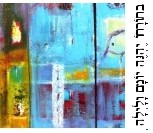
02.03.17 (Shevat 7, 5777) The sages advise not allowing a single day to pass without performing a mitzvah (i.e., doing a kindness), since "the one who keeps the commandment will know no evil" (שׁוֹמֵר מִצְוָה לא יֵדַע דָּבָר רָע, Eccl. 8:5), and "the kindness of the LORD is kol hayom" (חֶסֶד אֵל כָּל־הַיּוֹם), which means it is expressed all day long and every day (Psalm 52:1; Lam. 3:22-23). Attending to God's will by observing the commandments is therefore "performing the kindness of God" by being a conduit of grace to a fallen world. May it please the Lord to help us turn away from ourselves by keeping his commandments, and loving and serving others in the truth (Mark 12:29-31; John 15:12; Rom. 13:9; 1 John 4:21). Revere God and observe his commandments because zeh kol-ha'adam (זֶה כָּל־הָאָדָם), "this is the whole man," and this is the very reason you were created (Eccl. 12:13).
Right Thinking and Transformation...

02.02.17 (Shevat 6, 5777) The Scriptures counsel us to be transformed (μεταμορφόω) by "renewing our minds" (Rom. 12:2), though just how we are to do this remains an open question. Our perspectives and attitudes are shaped by our assumptions about life, many of which are "preconscious" or hidden from our awareness. Habitual thoughts, biases, prejudices, fears, etc., all affect (and distort) the way we see and understand reality. In light of this, how can we change? How can we overcome our habitual negativity, misery, and general unhappiness? How do we develop right thinking power? How do we learn to apply our minds to perceive the good, instead of responding in unreflective and negative ways to our circumstances? How do we discipline our will so that "if there is anything worthy of praise, think about these things" (Phil. 4:8)?
While there are many books on the subject of logic, detecting fallacies, and using sound reasoning techniques, there are not many that discuss the "morality" of our thinking, that is, exercising our God-given responsibility to perceive the truth and to consistently express it in our everyday actions. Since our thinking invariably leads to practical choices, we have a primary duty to know the truth and live out its implications in our lives. The failure to do so is not only inconsistent, logically speaking, but immoral, ethically speaking (and dangerous, spiritually speaking, since bondage is ignorance of the truth). If the truth bears witness that there is a personal God who creates each soul in the world, for instance, this should affect how we value and respect others, and the failure to do so will result in cognitive dissonance and internal contradiction that yields mental suffering, misery, emotional pain, and insecurity in our lives. A "double-minded" person is "two-souled" (δίψυχος), unstable (i.e., ungrounded, restless, unbalanced) in all his ways (James 1:8).
Healing comes from receiving the light of truth, being "single-minded," with our eyes focused on what is real. "If your eye is "single" (i.e., ἁπλοῦς, sincere, focused)," Yeshua said, "your whole body will be filled with light" (Matt. 6:22). We are to "renew" (ἀνακαινόω) our minds, which means elevating our thinking by focusing on God. Likewise the Torah commands: "You shall be made whole (i.e., tamin: תָּמִים) with the LORD your God" (Deut. 18:13). We are made "whole" or "perfect" (i.e., complete) when we resolutely turn to God for healing of our inner dividedness, as it says: "The Torah of the LORD is perfect (תָּמִים), returning the soul" (Psalm 19:8). And where it is written, "Let us hear end of the matter: Fear God and love his commandments, the text adds: ki zeh kol-ha'adam (כִּי־זֶה כָּל־הָאָדָם), "for this is the whole man," suggesting that those who return will be healed of their double-mindedness (Eccl. 12:13). Ultimately we are made whole when we are united to God in Messiah, for then we are "with the LORD our God" and the Spirit writes Torah within the heart of faith (Jer. 31:33).
Dioplia of Despair...

02.02.17 (Shevat 6, 5777) People often live in despair because they are double-minded. Consciously or not, they are attempting to look at two different things at once. They seek their end in a world of finite things – in "good fortune," in personal honor, in worldly entertainment, or other immediacies of the passing day. Such a cross-eyed approach leads to disorientation and spiritual destruction. A divided house cannot stand. But to be single-minded means first of all making the sincere decision to believe, and then confessing your faithlessness to God. As Soren Kierkegaard wisely observed: "No person is saved except by grace; but there is one sin that makes grace impossible, and that is dishonesty; and there is one thing God must forever and unconditionally require, and that is honesty." Therefore we are instructed to confess our faults one to another, and pray for one another, that we may be healed (James 5:16). As it is written: "You must be wholehearted (i.e., simple; sincere) with the LORD your God" (Deut. 18:13).
תָּמִים תִּהְיֶה עִם יְהוָה אֱלהֶיךָ
ta·mim · ti·he·yeh · im · Adonai · E·lo·he·kha

"You shall be wholehearted with the LORD your God"
(Deut. 18:13)

In the Sefer Torah (i.e., the handwritten Torah scroll), the first letter of the word tamim ("simple, wholehearted") is written extra LARGE in order to emphasize its importance. Notice also the little word im (עִם), "with," that follows in this verse. This hearkens to the simplicity spoken of by the prophet: "What does the LORD require of you but to do justice, and to love kindness (chesed), and to walk humbly with your God?" (Micah 6:8). Having a humble heart walks "with" the LORD. Genuine humility begins with the awareness that 1) there is a God and 2) you are not Him.... It is the practice of "knowing before whom you stand" and living your life in light of this fundamental truth.
When we study Scripture or things of "religion," we must be careful not to lose sight of what is important. We should serve God with "simplicity" (תֻּמָּה), that is, sincerely, with all our hearts and with straightforward intent. We should use a "single eye" and resist the temptation to "read into things" (Matt. 6:22-23). Indeed, God knows that we can evade the truth by means of being overly "sophisticated" when we read the Scriptures. The essential truth is plain enough, but we want to split hairs, consult a variety of commentaries, engage in mystical speculations, and so on, all in an attempt to defend ourselves against hearing from the Spirit of God! But as it says in Scriptures: holekh batom yelekh betach, "Whoever walks in simplicity (בַּתּם) walks securely" (Prov. 10:9).
Kierkegaard once lamented: "The matter is quite simple. The Bible is very easy to understand. But we Christians are a bunch of scheming swindlers. We pretend to be unable to understand it because we know very well that the minute we understand we are obliged to act accordingly." Indeed - there is a real danger of merely "thinking about" truth rather than living it... For instance, you might study the Psalms as literature and attempt to understand the nuances of Hebrew poetry, but that is altogether different than reading them with inner passion, with simple faith and the earnest desire to unite your heart's cry with the devotion that originally gave life to the sacred words... Likewise you might study Torah, pronounce the Name YHVH, carefully observe the festivals, and hope to "correct" Christians regarding their religion, and still be a lost soul... We must read with a heart of faith to unlock the truth that speaks to the heart. If you believe only what you understand, your faith is actually grounded in your own reasoning, not in the Divine Voice of Love.
Being the Beloved...

02.02.17 (Shevat 6, 5777) From our precious Torah we read God's pledge to rescue his people: "I will take you to be my people (וְלָקַחְתִּי אֶתְכֶם לִי לְעָם), and I will be your God (וְהָיִיתִי לָכֶם לֵאלהִים), and you shall know that I am the LORD your God" (וִידַעְתֶּם כִּי אֲנִי יְהוָה אֱלהֵיכֶם) (Exod. 6:7). This is the goal of redemption, succinctly stated: to be brought into covenant relationship with God in order to know that He is the LORD our God... We are released from bondage to receive Torah, to understand the truth of God's heart, and to walk in God's ways (see Deut. 10:12, Josh. 22:5; John 17:3).
וְעַתָּה יִשְׂרָאֵל מָה יְהוָה אֱלהֶיךָ שׁאֵל מֵעִמָּך
כִּי אִם־לְיִרְאָה אֶת־יְהוָה אֱלהֶיךָ לָלֶכֶת
בְּכָל־דְּרָכָיו וּלְאַהֲבָה אתוֹ וְלַעֲבד אֶת־יְהוָה אֱלהֶיךָ
בְּכָל־לְבָבְךָ וּבְכָל־נַפְשֶׁךָ
ve·at·tah Yisrael, mah Adonai E·lo·hey·kha sho·el me·im·makh
ki im le·yir·ah et Adonai E·lo·hey·kha la·le·chet
be·khol de·ra·khav ul·a·ha·vah o·to, ve·la·a·vod et Adonai
E·lo·hey·kha be·khol le·vav·kha uv·khol naf·she·ka?

"And now, Israel, what does the LORD your God require of you,
but to fear the LORD your God, to walk in all his ways, to love him,
to serve the LORD your God with all your heart and with all your soul?
(Deut. 10:12)

"And now, Israel, what does the LORD your God ask of you..?" (Deut. 10:12). These are words spoken to the the redeemed, the ransomed, the chosen, the beloved... God's love and faithfulness are manifest, and therefore it is always here and it is always "now," it is always time to walk in love… The midrash says that the word "and now" (וְעַתָּה) implies the "what" of teshuvah (תְּשׁוּבָה), that is, turning to God in this hour, regardless of whatever has happened in your past. True repentance turns you away from the darkness of fear to become present before the LORD (יהוה), who is the Source of light, life, love, and healing.
This is what the story of the Exodus is intended to teach us: We are personally chosen by God, redeemed by his grace, led out from from cruel bondage, led into the desert, away from the world, where we slowly begin to understand that we were valued, cared for, and beloved of God. God's heart is revealed in his passion and revelation. We learn to believe in the possibility of promise, of covenant... Only then are we able to hear the great request from heaven: "Now love Me..." In other words, we only truly can begin to love God by knowing we are beloved by God, and the invitation to love him is a response of his great heart for you (1 John 4:19). Accept that you are accepted in the heart of the Beloved (Eph. 1:4-6).
Coming rather than Going...

[ The following is related to this week's Torah reading, parashat Bo.... ]
02.02.17 (Shevat 6, 5777) Our Torah portion this week begins: "The LORD said to Moses, 'Come to Pharaoh, for I have hardened his heart and the heart of his servants, that I may show these signs of mine among them... and that you may know that I am the LORD'" (Exod. 10:1-2). Here the Torah used the word "come" (i.e., bo: בּא) rather than the word "go" (i.e., lekh: לך) because God was saying, "Come with me, for I am with you." The LORD was asking Moses to be his witness, to behold his glory, and to testify to the truth. Likewise our redemption may be seen more as a "coming" rather than as a "going." We don't just leave the sinful past behind us but come to discover the glory of true and infinite life that sustains all of reality... By coming to God, we change our direction as we no longer focus on the pain of our former lives but instead turn to focus on heaven, our true spiritual home. We learn to pursue the goal of the upward call of God in Messiah (Phil. 3:13-14). And as we come into the light, the LORD will cause us to know "orach chayim," the path of life; we will find joy in the Divine Presence; and we will discover pleasures that endure forever (Psalm 16:11).
תּוֹדִיעֵנִי ארַח חַיִּים
שׂבַע שְׂמָחוֹת אֶת־פָּנֶיךָ
נְעִמוֹת בִּימִינְךָ נֶצַח
to·di·ei·ni · o·rach · chai·yim
so·va' · se·ma·chot · et · pa·ne·kha
ne·i·mot · bi·min·kha · ne·tzach

"You will cause me to know the path of life;
in your presence there is fullness of joy;
at your right hand are pleasures forevermore."
(Psalm 16:11)

Download Study Card
Have you discovered the glory and wonder of God's love, despite the exile of your many sins and the shame of your life? Do you know "in your gut" that his love means no longer having to defend or explain yourself? God's love enables you to quit hiding what you really are from Him; you can give up the pretense of being something you're not. When you turn to the Lord in the transparency of your brokenness, weakness, and neediness, you will find Him there, accepting you for who you really are... The path of life is -- the path of life!
Spiritual Cardiopathy...

02.01.17 (Shevat 5, 5777) One symptom of "sklerocardia," that is, the condition of having a "hard heart," is unwillingness to be grateful for the gift of life and its various blessings. Such inner hardness desensitizes the soul, making us feel numb inside... People today tend to be thankless, intolerant, self-willed, and so "full of themselves" that they suppose they are doing God a big favor just by being alive. They proudly assume they are always right, and therefore they convince themselves that life "owes" them something. Such thinking resembles the arrogant character of Pharaoh, who took for granted all that he had as if it somehow was his "by right." In Hebrew, gratitude is called hakarat tovah (הַכָּרַת טוֹבָה), or the "recognition of the good." It is an openhearted attitude that appreciates each moment of life as a gift to be valued. Hardness of heart can make us "forget" to see, understand, hear, and remember the truth of God in our lives (Mark 8:17-19). When we are filled with anxiety or fear, for example, we are forgetting the truth and risk hardening our hearts.
Of course it is often a struggle to be a "joyful sojourner" in this dark and tragic world, and the temptation is to make ourselves numb inside. We must first of all be honest with ourselves. If we wrestle with our own hardness of heart, we must be careful to refuse despair, since despair hardens the heart even further... Instead, we must consciously recall that the LORD is merciful and gracious, slow to anger, and abounding in steadfast love and faithfulness (Psalm 103:8; 116:3-5). Keep faith that God alone can (and will) change our hearts to more resemble the inner life and character of Yeshua. Let's keep trusting for that and ask God to do this miracle for each of us, for the sake of the glory of His Name.
New Beginnings...

[ The following is related to this week's Torah reading, parashat Bo.... ]
02.01.17 (Shevat 5, 5777) The very first word of the Torah indicates the awareness of the significance of time - "in the beginning..." (Gen. 1:1), and according to Jewish tradition, the very first commandment given to the children of Israel (as a whole) was that of Rosh Chodesh (ראש חודש), or the declaration of the start (or head) of the "new month," particularly concerning the first month of their redemption (Exod. 12:2). In other words, Passover month was to begin Israel's year. Note that the word for month (i.e., chodesh) comes from the root chadash (חָדָש), meaning "new," and therefore the Passover redemption (chodesh yeshuah) was intended to mark a "new beginning" for the Jewish people. And indeed, God marks the start of our personal redemption as the beginning of our life as a new creation (2 Cor. 5:17), just as Yeshua is the "first of the firstfruits" of God's redeemed humanity (1 Cor. 15:45-49).
For more on this subject, see "Parashat Bo: The Significance of the Moon."
Harden Not Your Heart...
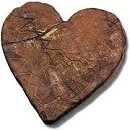
02.01.17 (Shevat 5, 5777) Sometimes hardness of heart comes as a result of living in a fallen world. Many people live with abiding "scar tissue" that surrounds their heart, making them feel numb and unwilling to open up and trust others. Their affections have become disordered and their ego rationalizes blaming others or seeking various forms of entitlement. "Turning off your heart" can mean suppressing any positive regard for others (empathy) while nurturing anger and self-righteousness, or it may mean withdrawing from others as a lifeless shell (both approaches vainly attempt to defend the heart from hurt). Although Yeshua always showed great compassion, especially to the wounded and broken in spirit (Isa. 42:3), He regularly condemned the "hardness of heart" ("sclero-cardia," σκληροκαρδία) of the self-righteous and religious types who were opposed his work of healing and love. Such indifference toward the suffering of others caused Yeshua to feel grief (Mark 3:5). Did not the Torah explicitly state: לא תְאַמֵּץ אֶת־לְבָבְךָ / "you shall not harden your heart" against your poor brother (Deut. 15:7)? How much more should a man not "put away" his wife? Moses was forced to "change" the original intent of the Torah regarding the question of divorce as a concession to the hardheartedness of sinful men (Matt. 19:3-9).
Perhaps the telltale sign of having a hard heart is the refusal to listen (i.e., obey) God's word. The LORD said to the prophet Ezekiel: "But the house of Israel will not be willing to listen to you, for they are not willing to listen to me: because all the house of Israel have a "strong forehead" (חִזְקֵי־מֵצַח) and a "hard heart" (קְשֵׁי־לֵב) (Ezek. 3:7, Cp. Jer. 5:23; 7:24). A hard heart has a form of "sclerosis" that makes it closed off and impermeable to love from others, and especially from God. Scripture uses various images to picture this condition, including a "heart of stone" (Ezek. 36:26, Zech. 7:12), an "uncircumcised heart" (Jer. 9:26), a "stiff neck" (Deut. 31:27), and so on. Stubbornness is really a form of idolatry, an exaltation of self-will that refuses to surrender to God.
Can believers in Yeshua have hard hearts? Yes, unfortunately, they can... When the disciples saw miracles, for example, they often did not understand because "their hearts were hardened" (Mark 6:52, 8:17). They had somehow "missed" the sense of awe, surprise, and wonder over the miraculous Presence of the LORD in their midst. They did not expect the miracles because their minds were made dull and unable to comprehend reality (John 12:40, Rom. 11:7, 2 Cor. 3:14, using the same Greek word, πωρόω). Yeshua linked this hardness to blindness, both physical and spiritual (John 12:40). Even after the resurrection, Yeshua rebuked his closest followers for their unbelief and hardness of heart (σκληροκαρδία), because they did not believe the testimony of Mary Magdalene and the other witnesses of His resurrection (Mark 16:11-14). The disciples somehow "forgot" Yeshua's repeated teaching that He must suffer, die, and be raised on the third day (Matt. 16:21; Luke 9:22).
Believers are furthermore warned not to become hardened (σκληρύνω) through the deceitfulness of sin (Heb. 3:13). Tolerance for sin causes the heart to become dull and deadened. Just as one mitzvah leads to another, so one sin leads to another... Allowing sin to go unchecked in your life (i.e., by "forgetting" to confess your sins) is to be under the influence of the "deceitfulness of sin" (ἀπάτῃ τῆς ἁμαρτίας). As Dietrich Bonhoeffer once wrote: "Silence in the face of evil is itself evil: God will not hold us guiltless. Not to speak is to speak. Not to act is to act."
In this sense, the deceitfulness of sin is really a form of self-deception (i.e., "fooling yourself"), since (by definition) sin requires the consent of the will to do its dirty business within the heart. When it comes to moral decisions, there really are no "accidental" sins. Can you imagine a man committing adultery and claiming that it was an "accident"? The deceitfulness of sin is also called the "lusts of deceit" (Eph. 4:22), from a Greek word (ἀπατάω) that means to be "cheated out" of something. Just as a hard heart refuses to see the Presence of God, so it refuses to see the danger of sin. Whether it disbelieves the miraculous in Yeshua or "winks at" the presence of sin, such hardness of heart inevitably leads to a sort of stupor or denial of reality. Such self-deception cheats you from living the life God calls you to live...
If we cry out to the LORD for salvation, He has promised to hear us (Rom. 10:13, Joel 2:32). The awareness that we are hardhearted and self-deceived can lead to a (blessed) sense of brokenness and despair -- i.e., to the realization that own self-sufficiency is futile and ultimately self-destructive. Turning to the LORD in despair of ourselves is a mark of humility. When we are emptied of ourselves, we are delivered from pride and self-deception and thereby enabled to truly ask for God's help... This is a miracle, since most of us have "a little Pharaoh inside," clamoring that we be the center of our universe and refusing to submit to the Presence of the LORD...
Note: We tend to think of hard-heartedness as stubbornness, or the unwillingness to humble ourselves and extend empathy toward others. And while this is true, we may also develop a hard heart by becoming complacent, or by closing our hearts to the possibility of change. In that sense, despair is a form of hardness of heart, since it denies the reality of hope... For more on this, see "Harden Not Your Heart: Further thoughts on Devarim."
What Pharaoh can teach us...
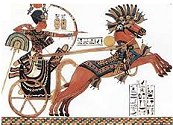
02.01.17 (Shevat 5, 5777) Though he sometimes appeared to change his mind in light of the intervention of God, Pharaoh nevertheless reverted to his older thinking after the danger seemed to pass. Such is the way of the wicked: their remorse over evil is short-lived, and as soon as their difficulty eases, they revert once again to their perverse ways. Therefore the Torah states that after each of the first five plagues, Pharaoh hardened (lit., "strengthened") his heart. It was only after five successive opportunities to face reality, to give up his claim to be god, to turn to the LORD in humility, however, that God ratified Pharaoh's will by "helping him" become the person he decided to be. Therefore after the sixth plague the Torah states, "And the LORD strengthened Pharaoh's heart" (Exod. 9:12). As C.S. Lewis once said, ultimately 'there are only two kinds of people in the end: those who say to God, 'Thy will be done,' and those to whom God says, Thy will be done."
Pharaoh teaches us that God will never force a sinner to turn away from their sin, but if they willfully continue to sin, they may become unable to turn, trapped in a very difficult place.... The Shemot Rabbah states: "The Holy One, blessed be He, gives someone a chance to repent, and not only one opportunity but several chances: once, twice, three times. But then, if the person still has not repented, God locks the person's heart altogether, cutting off the possibility of repentance in the future." There is a very real risk that those who choose to be at war with God, who flatly refuse repeated appeals to turn to the LORD, will become progressively "strengthened" in their resolution to defy reality...
Defiance of Heart...

[ The following is related to our Torah reading for this week, Parashat Bo... ]
02.01.17 (Shevat 5, 5777) The term hashgachah (הַשְׁגָּחָה) is sometimes used to refer to God's providential decrees. A midrash says, "God appoints an angel and tells it to cause a blade of grass to grow. Only then does that tiny blade flourish" (Bereshit Rabbah). There are no coincidences in God's universe; no "butterfly effect" apart from His hand.
In Jewish theology, there is elaborate discussion about how God's decrees (gezerah merosh) do not violate man's free will (bechirah chofshit). In general, the sages decided that hashgachah refers to events we can't control, whereas it's our responsibility to make godly choices. This compatibilism became enshrined in the maxim: "Everything is foreseen by God, yet free will is granted to man" (Pirke Avot 3:19).
 |
Though this idea of reconciling God's omniscience and human freedom may seem paradoxical, the Scriptures actually go further and state that God's decrees can overrule human decision entirely. "The king's heart is a stream of water in the hand of the LORD; He directs it to whatever He wishes" (Prov. 21:1).
During the account of the Exodus, in several places the Torah says that the LORD "hardened Pharaoh's heart" (וַיְחַזֵּק יהוה אֶת־לֵב פַּרְעה) so that he would not change his mind and set the Israelites free. How do we make sense of this idea? Does this imply that people do not have free will (בְּחִירָת חָפְשִׁית) after all?
The midrash (Shemot Rabbah) notes that God indeed hardened Pharaoh's heart, but only after the despot had already hardened it by refusing the message of the first five plagues (Exod. 7:22, 8:15, 8:19, 8:32, 9:7). After the sixth plague, however, the text reads, "And the LORD hardened Pharaoh's heart" / וַיְחַזֵּק יהוה אֶת־לֵב פַּרְעה (Exod. 9:12). Notice that the word "hardened" comes from chazak (strong), suggesting that Pharaoh's will was made more resolute, defiant and obstinate.
Such hardening of heart is a form of punishment (or correction). If someone refuses to submit to God and strengthens his or her resolve to do so, God may ratify the person's decision and foreclose repentance for a season... As Shemot Rabbah 13:5 says:
The Holy One, blessed be He, gives someone a chance to repent, and not only one opportunity but several chances: once, twice, three times. But then, if the person still has not repented, God locks the person's heart altogether, cutting off the possibility of repentance in the future.
Proverbs 28:14 says, "Happy is the man who fears always, but the one who hardens his heart will fall into evil." If we find ourselves opposing God, our punishment might be prolonged through the process of hardening. This is the phenomenological aspect of our own inward rebellion. Often we are not conscious of it within ourselves, and then -- when we are made conscious -- we find ourselves helpless to change direction. The sages wrote, "God leads men along a path which they themselves choose. If a man wants to be good, God leads him toward goodness; if he wants to travel an evil road, God helps him do that, too." "The heart of a man plans his way, but the LORD establishes his steps" (Prov. 16:9):
לֵב אָדָם יְחַשֵּׁב דַּרְכּוֹ וַיהוָה יָכִין צַעֲדוֹ
lev a·dam ye·cha·shev dar·ko, va'Adonai ya·khin tza·a·do

"The heart of man plans his way,
but the LORD directs his steps" (Prov. 16:9)

Download Study Card
What the sages perhaps overlooked is that the hardening of heart can eventually lead to a sense of brokenness and despair -- i.e., the realization that the strength of own self-sufficiency is proven to be of no avail. Turning to the LORD in despair of ourselves is a mark of humility. When we are emptied of ourselves, we are delivered from pride and thereby enabled to confess our need for God's help... This is a miracle, since most of us have "a little Pharaoh inside," clamoring that we be the center of our universe and refusing to submit to the Presence of the LORD...
Note: For more on this topic, see "Hardening of Heart: Further thoughts on Parashat Bo."
Facing our Pharaohs...

02.01.17 (Shevat 5, 5777) The sages sometimes allegorize the Exodus into a parable about the journey of our faith. Moses represents our heart called by God whereas Pharaoh represents our sin nature and the tyranny of the ego... Like Moses you are called by God to "come to Pharaoh," that is, to confront what keeps you from experiencing your freedom. The "heart of Pharaoh" represents your cynical and hardened self – the defensive ego that is fearful and marked by unhealed grief. You must face this "Pharaoh" and courageously demand to be set free to serve the LORD. The power of Pharaoh represents the "surface" of things - the world and its burdens, its fleeting vanities, its ongoing "need" to control others, and so on. Salvation (יְשׁוּעָה) is likened to rebirth that delivers us from the "narrow places of Egypt" (i.e., from mitzrayim: -מ, "from," and צַר, "narrow") into newness of life...
Faith of the Heart...

02.01.17 (Shevat 5, 5777) Those who refuse the truth of God are described as those who "walk in the futility (ματαιότης) of their minds" (Eph. 4:17). "They are darkened in their understanding, alienated from the life of God because of the ignorance (i.e., ἄγνοια - "agnosticism") that is in them, due to their hardness of heart" (Eph. 4:18). This hardness of heart (σκληροκαρδία) leads to a cynical state of callousness or apathy (ἀπαλγέω, lit. "numbness," the "inability to feel"), which is the very opposite of empathy or compassion (Eph. 4:19). Notice the progression of this process. People close their eyes to the light and become estranged from the life of God because they choose to have a hard heart (לב קשה). Put the other way around, hardening the heart leads to willed ignorance, alienation from the life of God, darkened understanding, and a "futile" mind... But notice that the heart of man is central because it determines the "contours of life" (Prov. 4:23). It is the heart (לֵבָב), or the "inner man," that that focuses the will to believe, determining what we acknowledge and what we ignore. Indeed, salvation itself is a matter of turning to see (teshuvah) and believing from the heart (πιστεύσῃς ἐν τῇ καρδίᾳ σου) the Reality of God's great love and healing given to us in Yeshua (Rom. 10:9).
|



